International Criminal Court: An Overview of Powers and Jurisprudence
VerifiedAdded on 2023/06/11
|17
|7394
|121
Essay
AI Summary
This essay provides a detailed analysis of the International Criminal Court (ICC), its structure, jurisdiction, and the powers of its prosecutors. It examines the ICC's role as a primary international tribunal for prosecuting individuals accused of severe crimes such as genocide, crimes against humanity, and war crimes. The essay elaborates on the legal provisions governing the ICC's administration, focusing on the powers of prosecutors in initiating criminal investigations, as outlined in the Rome Statute. It also discusses specific cases involving countries like Myanmar, Bangladesh, and Palestine, highlighting the challenges and issues encountered by the ICC in these contexts. Furthermore, the essay contrasts the role of the prosecutor according to Article 13 and examines Article 54 of the ICC, while also touching upon the need for reforms within the ICC to enhance its effectiveness in addressing international crimes. The document is available on Desklib, a platform providing study tools and resources for students.
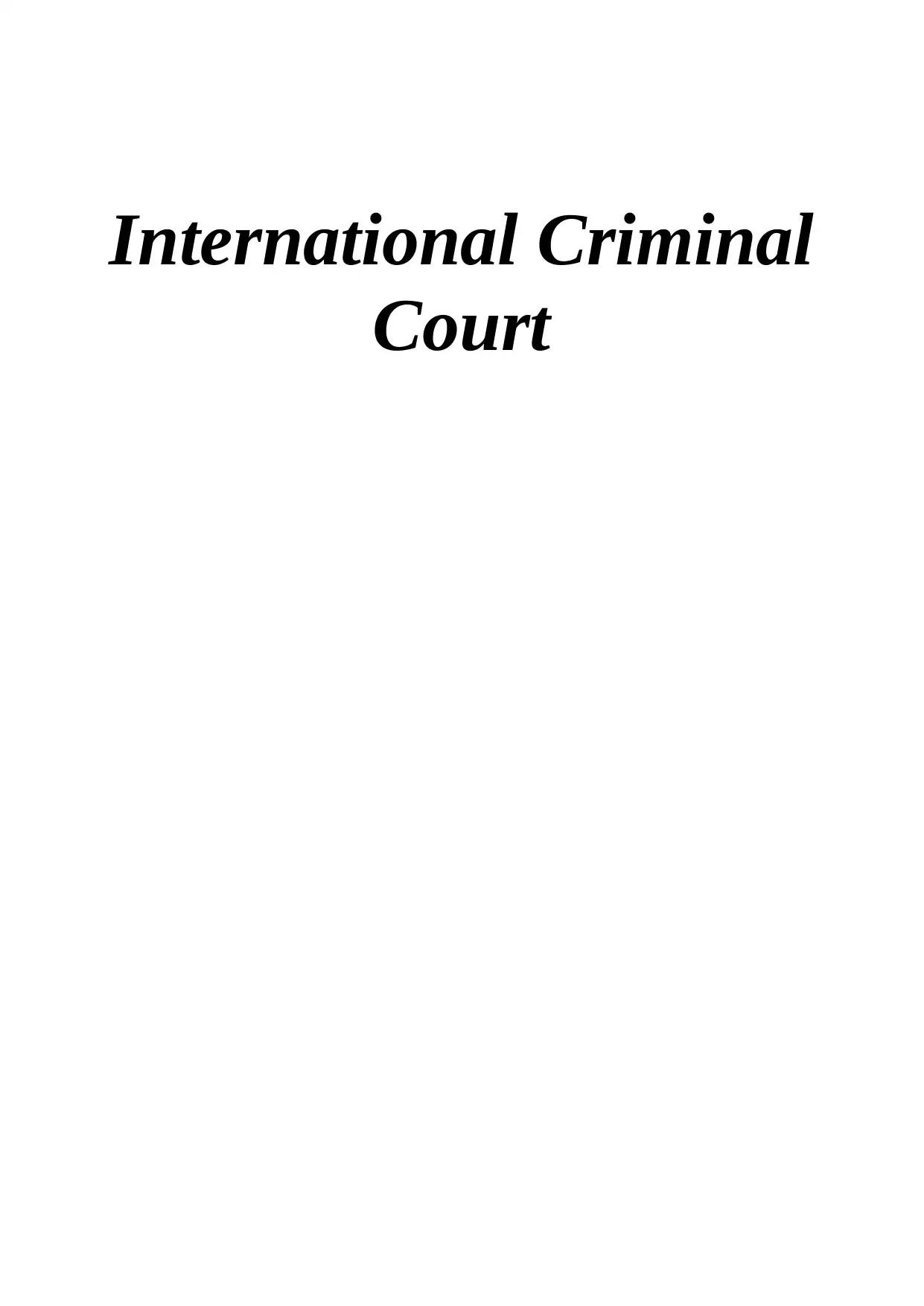
International Criminal
Court
Court
Secure Best Marks with AI Grader
Need help grading? Try our AI Grader for instant feedback on your assignments.
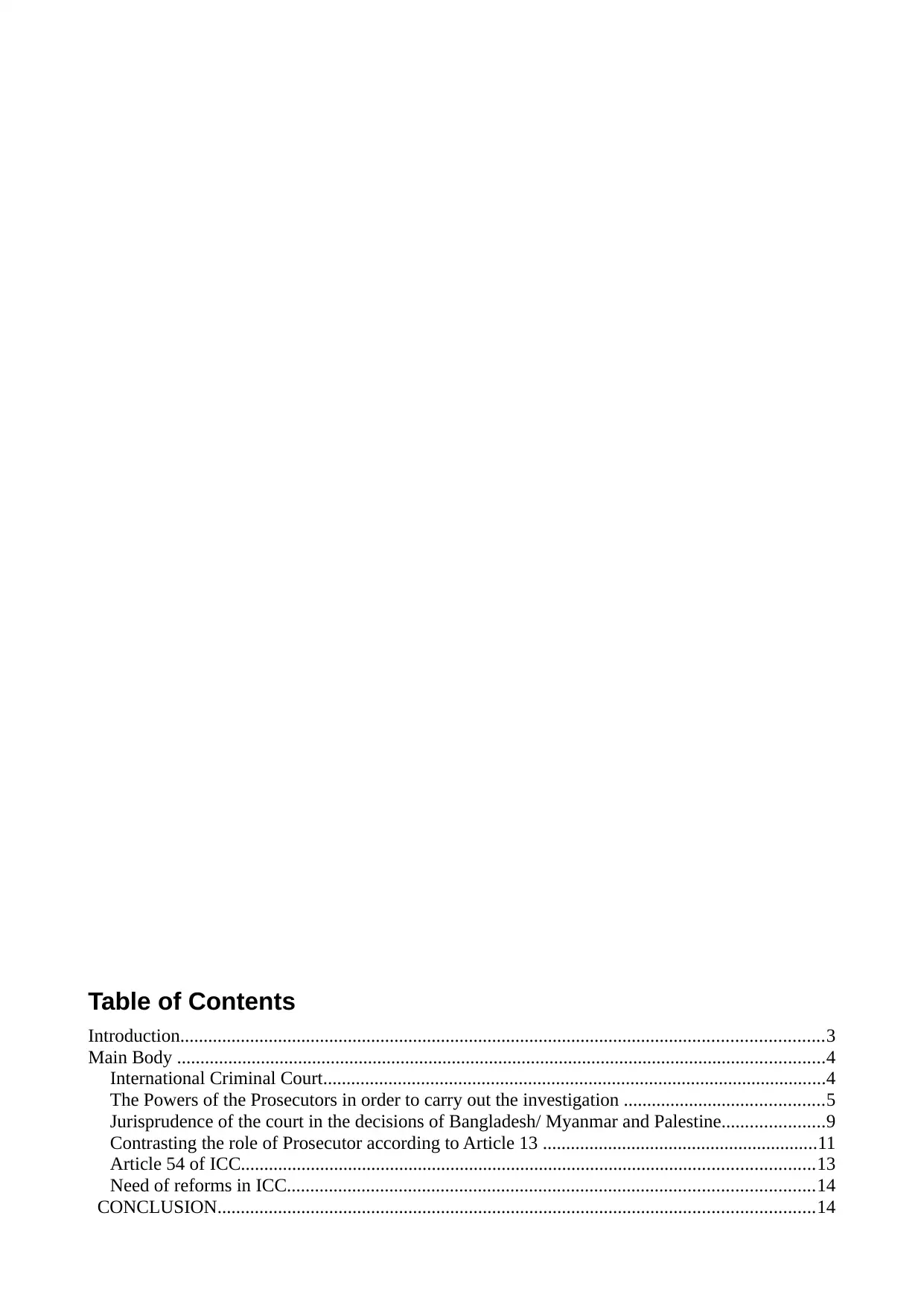
Table of Contents
Introduction..........................................................................................................................................3
Main Body ...........................................................................................................................................4
International Criminal Court............................................................................................................4
The Powers of the Prosecutors in order to carry out the investigation ...........................................5
Jurisprudence of the court in the decisions of Bangladesh/ Myanmar and Palestine......................9
Contrasting the role of Prosecutor according to Article 13 ...........................................................11
Article 54 of ICC...........................................................................................................................13
Need of reforms in ICC.................................................................................................................14
CONCLUSION................................................................................................................................14
Introduction..........................................................................................................................................3
Main Body ...........................................................................................................................................4
International Criminal Court............................................................................................................4
The Powers of the Prosecutors in order to carry out the investigation ...........................................5
Jurisprudence of the court in the decisions of Bangladesh/ Myanmar and Palestine......................9
Contrasting the role of Prosecutor according to Article 13 ...........................................................11
Article 54 of ICC...........................................................................................................................13
Need of reforms in ICC.................................................................................................................14
CONCLUSION................................................................................................................................14
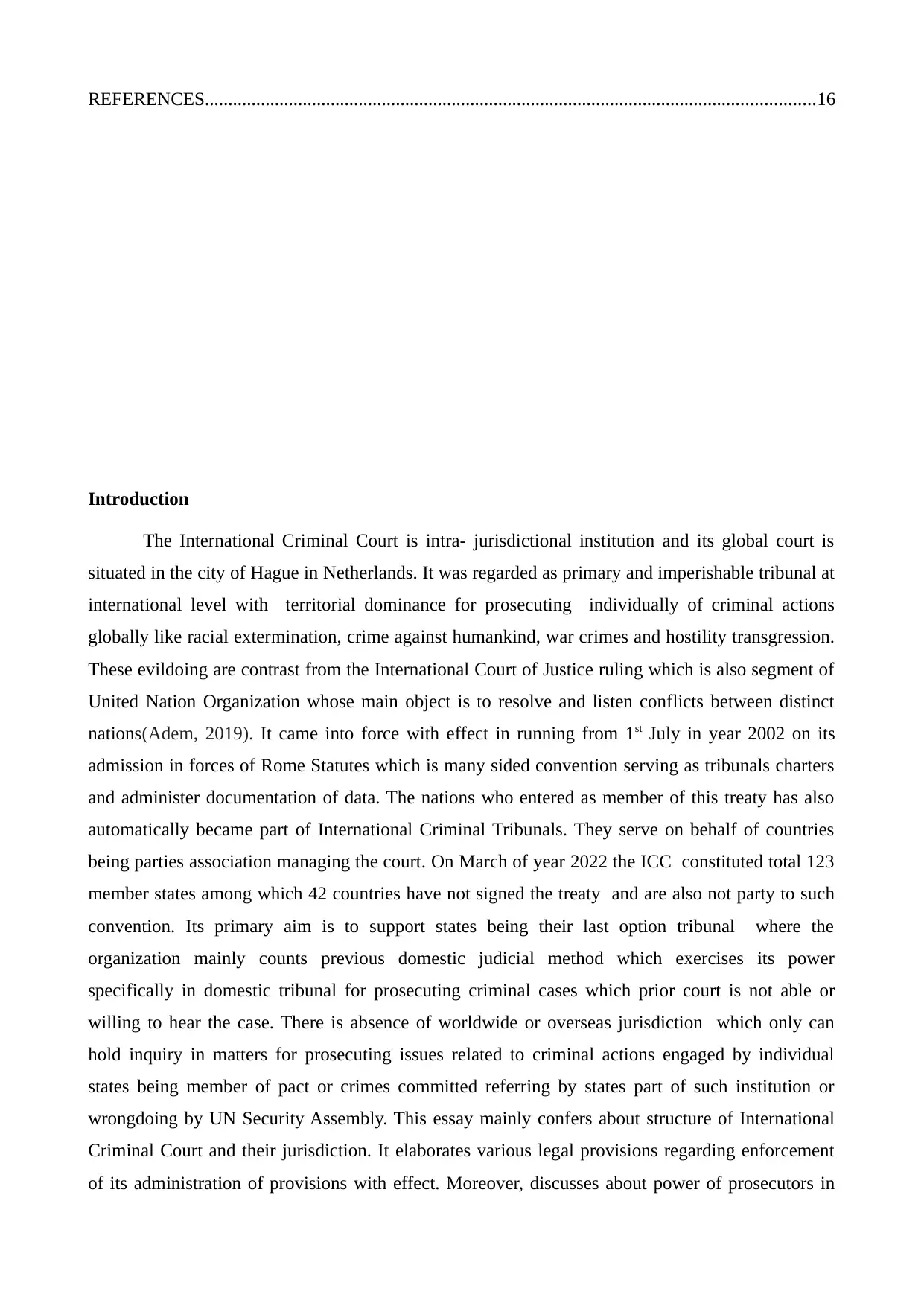
REFERENCES...................................................................................................................................16
Introduction
The International Criminal Court is intra- jurisdictional institution and its global court is
situated in the city of Hague in Netherlands. It was regarded as primary and imperishable tribunal at
international level with territorial dominance for prosecuting individually of criminal actions
globally like racial extermination, crime against humankind, war crimes and hostility transgression.
These evildoing are contrast from the International Court of Justice ruling which is also segment of
United Nation Organization whose main object is to resolve and listen conflicts between distinct
nations(Adem, 2019). It came into force with effect in running from 1st July in year 2002 on its
admission in forces of Rome Statutes which is many sided convention serving as tribunals charters
and administer documentation of data. The nations who entered as member of this treaty has also
automatically became part of International Criminal Tribunals. They serve on behalf of countries
being parties association managing the court. On March of year 2022 the ICC constituted total 123
member states among which 42 countries have not signed the treaty and are also not party to such
convention. Its primary aim is to support states being their last option tribunal where the
organization mainly counts previous domestic judicial method which exercises its power
specifically in domestic tribunal for prosecuting criminal cases which prior court is not able or
willing to hear the case. There is absence of worldwide or overseas jurisdiction which only can
hold inquiry in matters for prosecuting issues related to criminal actions engaged by individual
states being member of pact or crimes committed referring by states part of such institution or
wrongdoing by UN Security Assembly. This essay mainly confers about structure of International
Criminal Court and their jurisdiction. It elaborates various legal provisions regarding enforcement
of its administration of provisions with effect. Moreover, discusses about power of prosecutors in
Introduction
The International Criminal Court is intra- jurisdictional institution and its global court is
situated in the city of Hague in Netherlands. It was regarded as primary and imperishable tribunal at
international level with territorial dominance for prosecuting individually of criminal actions
globally like racial extermination, crime against humankind, war crimes and hostility transgression.
These evildoing are contrast from the International Court of Justice ruling which is also segment of
United Nation Organization whose main object is to resolve and listen conflicts between distinct
nations(Adem, 2019). It came into force with effect in running from 1st July in year 2002 on its
admission in forces of Rome Statutes which is many sided convention serving as tribunals charters
and administer documentation of data. The nations who entered as member of this treaty has also
automatically became part of International Criminal Tribunals. They serve on behalf of countries
being parties association managing the court. On March of year 2022 the ICC constituted total 123
member states among which 42 countries have not signed the treaty and are also not party to such
convention. Its primary aim is to support states being their last option tribunal where the
organization mainly counts previous domestic judicial method which exercises its power
specifically in domestic tribunal for prosecuting criminal cases which prior court is not able or
willing to hear the case. There is absence of worldwide or overseas jurisdiction which only can
hold inquiry in matters for prosecuting issues related to criminal actions engaged by individual
states being member of pact or crimes committed referring by states part of such institution or
wrongdoing by UN Security Assembly. This essay mainly confers about structure of International
Criminal Court and their jurisdiction. It elaborates various legal provisions regarding enforcement
of its administration of provisions with effect. Moreover, discusses about power of prosecutors in
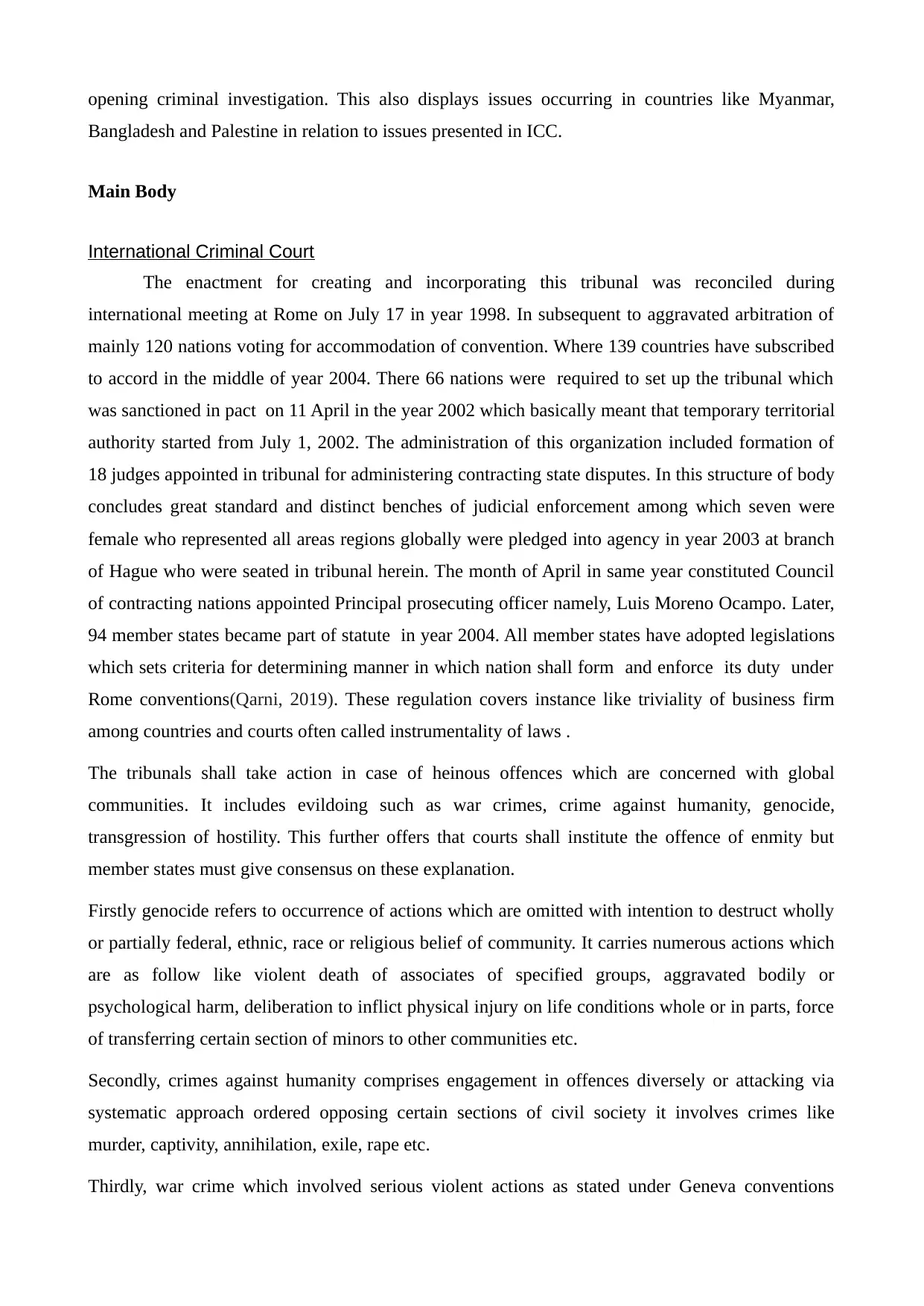
opening criminal investigation. This also displays issues occurring in countries like Myanmar,
Bangladesh and Palestine in relation to issues presented in ICC.
Main Body
International Criminal Court
The enactment for creating and incorporating this tribunal was reconciled during
international meeting at Rome on July 17 in year 1998. In subsequent to aggravated arbitration of
mainly 120 nations voting for accommodation of convention. Where 139 countries have subscribed
to accord in the middle of year 2004. There 66 nations were required to set up the tribunal which
was sanctioned in pact on 11 April in the year 2002 which basically meant that temporary territorial
authority started from July 1, 2002. The administration of this organization included formation of
18 judges appointed in tribunal for administering contracting state disputes. In this structure of body
concludes great standard and distinct benches of judicial enforcement among which seven were
female who represented all areas regions globally were pledged into agency in year 2003 at branch
of Hague who were seated in tribunal herein. The month of April in same year constituted Council
of contracting nations appointed Principal prosecuting officer namely, Luis Moreno Ocampo. Later,
94 member states became part of statute in year 2004. All member states have adopted legislations
which sets criteria for determining manner in which nation shall form and enforce its duty under
Rome conventions(Qarni, 2019). These regulation covers instance like triviality of business firm
among countries and courts often called instrumentality of laws .
The tribunals shall take action in case of heinous offences which are concerned with global
communities. It includes evildoing such as war crimes, crime against humanity, genocide,
transgression of hostility. This further offers that courts shall institute the offence of enmity but
member states must give consensus on these explanation.
Firstly genocide refers to occurrence of actions which are omitted with intention to destruct wholly
or partially federal, ethnic, race or religious belief of community. It carries numerous actions which
are as follow like violent death of associates of specified groups, aggravated bodily or
psychological harm, deliberation to inflict physical injury on life conditions whole or in parts, force
of transferring certain section of minors to other communities etc.
Secondly, crimes against humanity comprises engagement in offences diversely or attacking via
systematic approach ordered opposing certain sections of civil society it involves crimes like
murder, captivity, annihilation, exile, rape etc.
Thirdly, war crime which involved serious violent actions as stated under Geneva conventions
Bangladesh and Palestine in relation to issues presented in ICC.
Main Body
International Criminal Court
The enactment for creating and incorporating this tribunal was reconciled during
international meeting at Rome on July 17 in year 1998. In subsequent to aggravated arbitration of
mainly 120 nations voting for accommodation of convention. Where 139 countries have subscribed
to accord in the middle of year 2004. There 66 nations were required to set up the tribunal which
was sanctioned in pact on 11 April in the year 2002 which basically meant that temporary territorial
authority started from July 1, 2002. The administration of this organization included formation of
18 judges appointed in tribunal for administering contracting state disputes. In this structure of body
concludes great standard and distinct benches of judicial enforcement among which seven were
female who represented all areas regions globally were pledged into agency in year 2003 at branch
of Hague who were seated in tribunal herein. The month of April in same year constituted Council
of contracting nations appointed Principal prosecuting officer namely, Luis Moreno Ocampo. Later,
94 member states became part of statute in year 2004. All member states have adopted legislations
which sets criteria for determining manner in which nation shall form and enforce its duty under
Rome conventions(Qarni, 2019). These regulation covers instance like triviality of business firm
among countries and courts often called instrumentality of laws .
The tribunals shall take action in case of heinous offences which are concerned with global
communities. It includes evildoing such as war crimes, crime against humanity, genocide,
transgression of hostility. This further offers that courts shall institute the offence of enmity but
member states must give consensus on these explanation.
Firstly genocide refers to occurrence of actions which are omitted with intention to destruct wholly
or partially federal, ethnic, race or religious belief of community. It carries numerous actions which
are as follow like violent death of associates of specified groups, aggravated bodily or
psychological harm, deliberation to inflict physical injury on life conditions whole or in parts, force
of transferring certain section of minors to other communities etc.
Secondly, crimes against humanity comprises engagement in offences diversely or attacking via
systematic approach ordered opposing certain sections of civil society it involves crimes like
murder, captivity, annihilation, exile, rape etc.
Thirdly, war crime which involved serious violent actions as stated under Geneva conventions
Secure Best Marks with AI Grader
Need help grading? Try our AI Grader for instant feedback on your assignments.
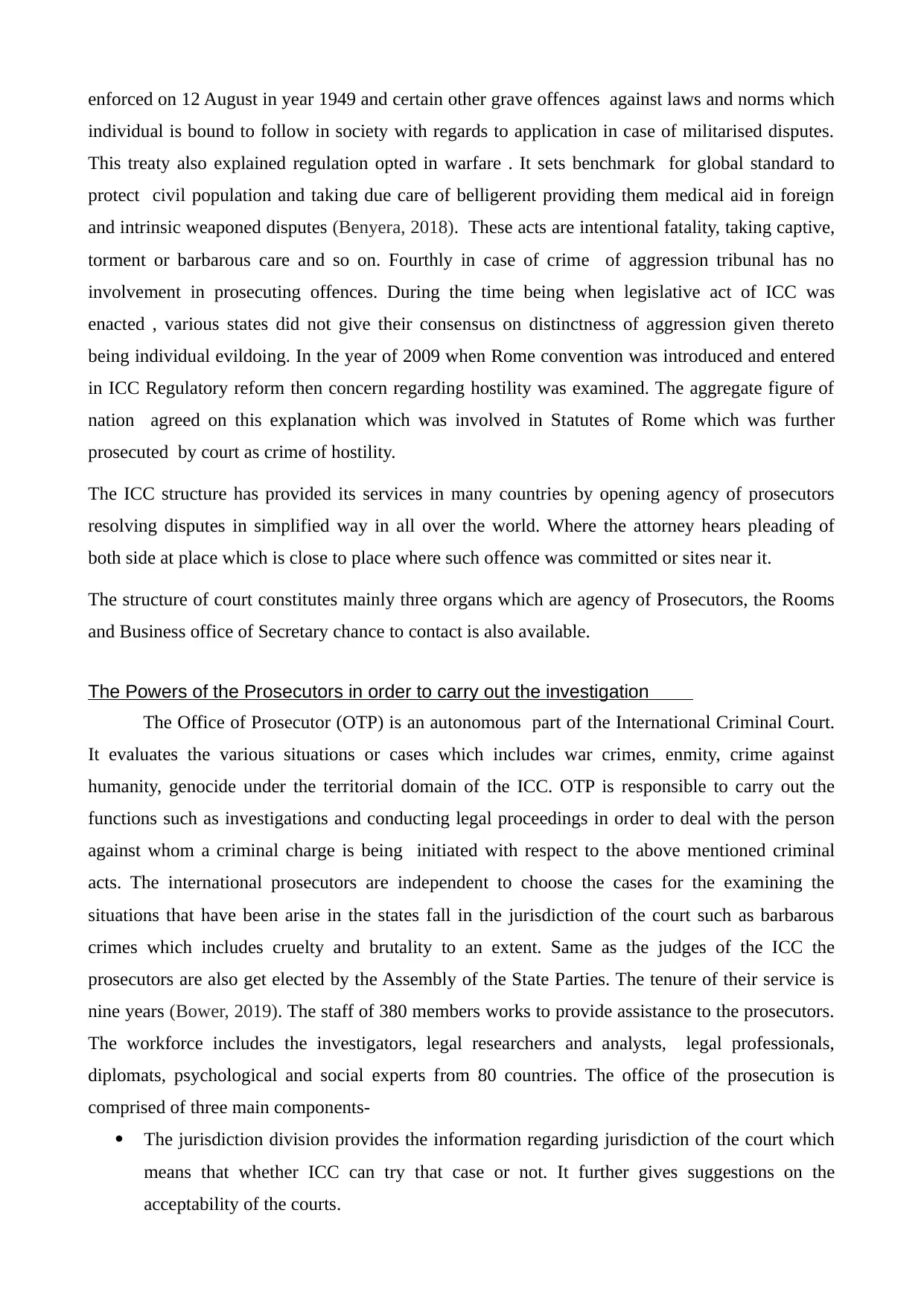
enforced on 12 August in year 1949 and certain other grave offences against laws and norms which
individual is bound to follow in society with regards to application in case of militarised disputes.
This treaty also explained regulation opted in warfare . It sets benchmark for global standard to
protect civil population and taking due care of belligerent providing them medical aid in foreign
and intrinsic weaponed disputes (Benyera, 2018). These acts are intentional fatality, taking captive,
torment or barbarous care and so on. Fourthly in case of crime of aggression tribunal has no
involvement in prosecuting offences. During the time being when legislative act of ICC was
enacted , various states did not give their consensus on distinctness of aggression given thereto
being individual evildoing. In the year of 2009 when Rome convention was introduced and entered
in ICC Regulatory reform then concern regarding hostility was examined. The aggregate figure of
nation agreed on this explanation which was involved in Statutes of Rome which was further
prosecuted by court as crime of hostility.
The ICC structure has provided its services in many countries by opening agency of prosecutors
resolving disputes in simplified way in all over the world. Where the attorney hears pleading of
both side at place which is close to place where such offence was committed or sites near it.
The structure of court constitutes mainly three organs which are agency of Prosecutors, the Rooms
and Business office of Secretary chance to contact is also available.
The Powers of the Prosecutors in order to carry out the investigation
The Office of Prosecutor (OTP) is an autonomous part of the International Criminal Court.
It evaluates the various situations or cases which includes war crimes, enmity, crime against
humanity, genocide under the territorial domain of the ICC. OTP is responsible to carry out the
functions such as investigations and conducting legal proceedings in order to deal with the person
against whom a criminal charge is being initiated with respect to the above mentioned criminal
acts. The international prosecutors are independent to choose the cases for the examining the
situations that have been arise in the states fall in the jurisdiction of the court such as barbarous
crimes which includes cruelty and brutality to an extent. Same as the judges of the ICC the
prosecutors are also get elected by the Assembly of the State Parties. The tenure of their service is
nine years (Bower, 2019). The staff of 380 members works to provide assistance to the prosecutors.
The workforce includes the investigators, legal researchers and analysts, legal professionals,
diplomats, psychological and social experts from 80 countries. The office of the prosecution is
comprised of three main components-
The jurisdiction division provides the information regarding jurisdiction of the court which
means that whether ICC can try that case or not. It further gives suggestions on the
acceptability of the courts.
individual is bound to follow in society with regards to application in case of militarised disputes.
This treaty also explained regulation opted in warfare . It sets benchmark for global standard to
protect civil population and taking due care of belligerent providing them medical aid in foreign
and intrinsic weaponed disputes (Benyera, 2018). These acts are intentional fatality, taking captive,
torment or barbarous care and so on. Fourthly in case of crime of aggression tribunal has no
involvement in prosecuting offences. During the time being when legislative act of ICC was
enacted , various states did not give their consensus on distinctness of aggression given thereto
being individual evildoing. In the year of 2009 when Rome convention was introduced and entered
in ICC Regulatory reform then concern regarding hostility was examined. The aggregate figure of
nation agreed on this explanation which was involved in Statutes of Rome which was further
prosecuted by court as crime of hostility.
The ICC structure has provided its services in many countries by opening agency of prosecutors
resolving disputes in simplified way in all over the world. Where the attorney hears pleading of
both side at place which is close to place where such offence was committed or sites near it.
The structure of court constitutes mainly three organs which are agency of Prosecutors, the Rooms
and Business office of Secretary chance to contact is also available.
The Powers of the Prosecutors in order to carry out the investigation
The Office of Prosecutor (OTP) is an autonomous part of the International Criminal Court.
It evaluates the various situations or cases which includes war crimes, enmity, crime against
humanity, genocide under the territorial domain of the ICC. OTP is responsible to carry out the
functions such as investigations and conducting legal proceedings in order to deal with the person
against whom a criminal charge is being initiated with respect to the above mentioned criminal
acts. The international prosecutors are independent to choose the cases for the examining the
situations that have been arise in the states fall in the jurisdiction of the court such as barbarous
crimes which includes cruelty and brutality to an extent. Same as the judges of the ICC the
prosecutors are also get elected by the Assembly of the State Parties. The tenure of their service is
nine years (Bower, 2019). The staff of 380 members works to provide assistance to the prosecutors.
The workforce includes the investigators, legal researchers and analysts, legal professionals,
diplomats, psychological and social experts from 80 countries. The office of the prosecution is
comprised of three main components-
The jurisdiction division provides the information regarding jurisdiction of the court which
means that whether ICC can try that case or not. It further gives suggestions on the
acceptability of the courts.
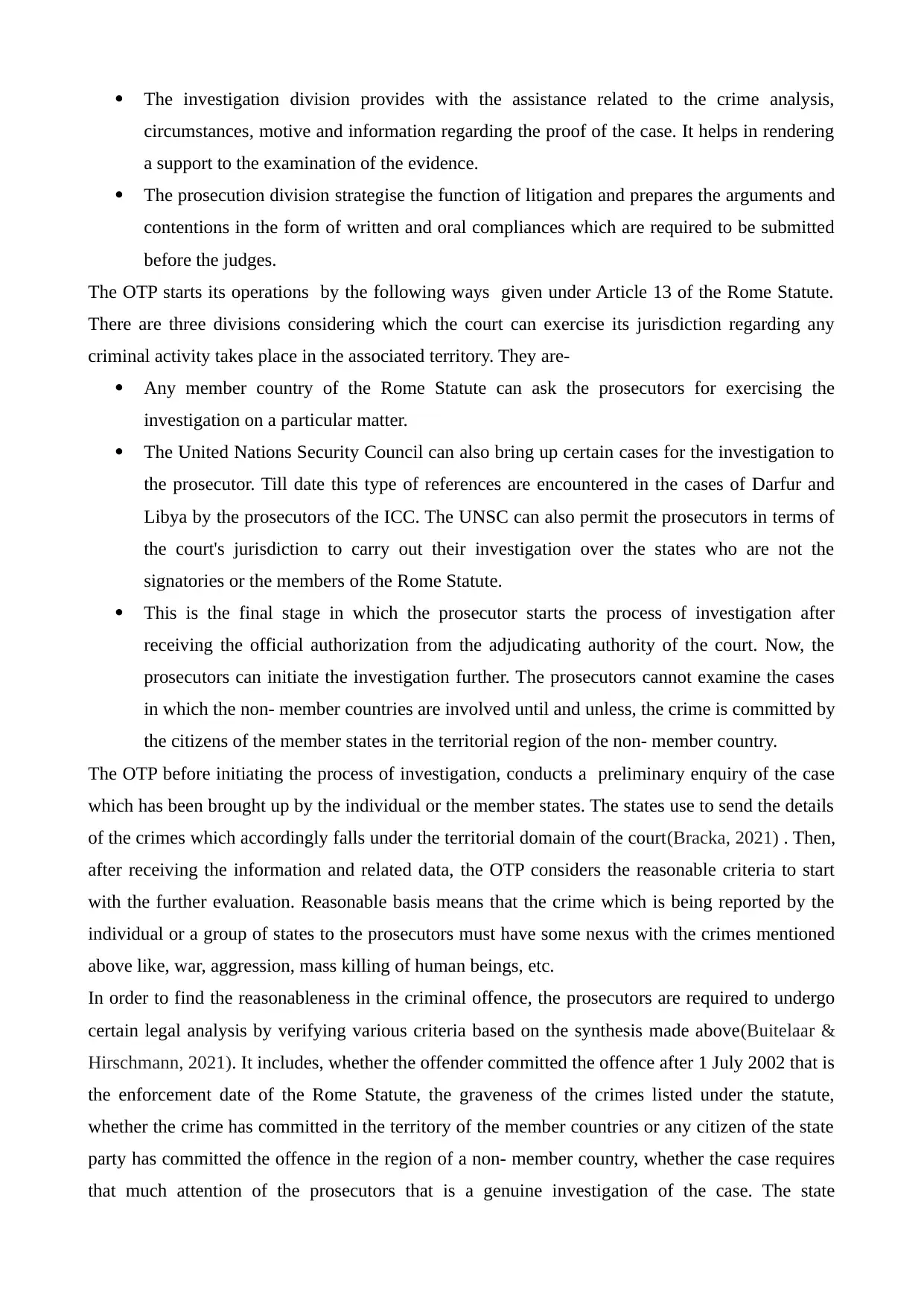
The investigation division provides with the assistance related to the crime analysis,
circumstances, motive and information regarding the proof of the case. It helps in rendering
a support to the examination of the evidence.
The prosecution division strategise the function of litigation and prepares the arguments and
contentions in the form of written and oral compliances which are required to be submitted
before the judges.
The OTP starts its operations by the following ways given under Article 13 of the Rome Statute.
There are three divisions considering which the court can exercise its jurisdiction regarding any
criminal activity takes place in the associated territory. They are-
Any member country of the Rome Statute can ask the prosecutors for exercising the
investigation on a particular matter.
The United Nations Security Council can also bring up certain cases for the investigation to
the prosecutor. Till date this type of references are encountered in the cases of Darfur and
Libya by the prosecutors of the ICC. The UNSC can also permit the prosecutors in terms of
the court's jurisdiction to carry out their investigation over the states who are not the
signatories or the members of the Rome Statute.
This is the final stage in which the prosecutor starts the process of investigation after
receiving the official authorization from the adjudicating authority of the court. Now, the
prosecutors can initiate the investigation further. The prosecutors cannot examine the cases
in which the non- member countries are involved until and unless, the crime is committed by
the citizens of the member states in the territorial region of the non- member country.
The OTP before initiating the process of investigation, conducts a preliminary enquiry of the case
which has been brought up by the individual or the member states. The states use to send the details
of the crimes which accordingly falls under the territorial domain of the court(Bracka, 2021) . Then,
after receiving the information and related data, the OTP considers the reasonable criteria to start
with the further evaluation. Reasonable basis means that the crime which is being reported by the
individual or a group of states to the prosecutors must have some nexus with the crimes mentioned
above like, war, aggression, mass killing of human beings, etc.
In order to find the reasonableness in the criminal offence, the prosecutors are required to undergo
certain legal analysis by verifying various criteria based on the synthesis made above(Buitelaar &
Hirschmann, 2021). It includes, whether the offender committed the offence after 1 July 2002 that is
the enforcement date of the Rome Statute, the graveness of the crimes listed under the statute,
whether the crime has committed in the territory of the member countries or any citizen of the state
party has committed the offence in the region of a non- member country, whether the case requires
that much attention of the prosecutors that is a genuine investigation of the case. The state
circumstances, motive and information regarding the proof of the case. It helps in rendering
a support to the examination of the evidence.
The prosecution division strategise the function of litigation and prepares the arguments and
contentions in the form of written and oral compliances which are required to be submitted
before the judges.
The OTP starts its operations by the following ways given under Article 13 of the Rome Statute.
There are three divisions considering which the court can exercise its jurisdiction regarding any
criminal activity takes place in the associated territory. They are-
Any member country of the Rome Statute can ask the prosecutors for exercising the
investigation on a particular matter.
The United Nations Security Council can also bring up certain cases for the investigation to
the prosecutor. Till date this type of references are encountered in the cases of Darfur and
Libya by the prosecutors of the ICC. The UNSC can also permit the prosecutors in terms of
the court's jurisdiction to carry out their investigation over the states who are not the
signatories or the members of the Rome Statute.
This is the final stage in which the prosecutor starts the process of investigation after
receiving the official authorization from the adjudicating authority of the court. Now, the
prosecutors can initiate the investigation further. The prosecutors cannot examine the cases
in which the non- member countries are involved until and unless, the crime is committed by
the citizens of the member states in the territorial region of the non- member country.
The OTP before initiating the process of investigation, conducts a preliminary enquiry of the case
which has been brought up by the individual or the member states. The states use to send the details
of the crimes which accordingly falls under the territorial domain of the court(Bracka, 2021) . Then,
after receiving the information and related data, the OTP considers the reasonable criteria to start
with the further evaluation. Reasonable basis means that the crime which is being reported by the
individual or a group of states to the prosecutors must have some nexus with the crimes mentioned
above like, war, aggression, mass killing of human beings, etc.
In order to find the reasonableness in the criminal offence, the prosecutors are required to undergo
certain legal analysis by verifying various criteria based on the synthesis made above(Buitelaar &
Hirschmann, 2021). It includes, whether the offender committed the offence after 1 July 2002 that is
the enforcement date of the Rome Statute, the graveness of the crimes listed under the statute,
whether the crime has committed in the territory of the member countries or any citizen of the state
party has committed the offence in the region of a non- member country, whether the case requires
that much attention of the prosecutors that is a genuine investigation of the case. The state
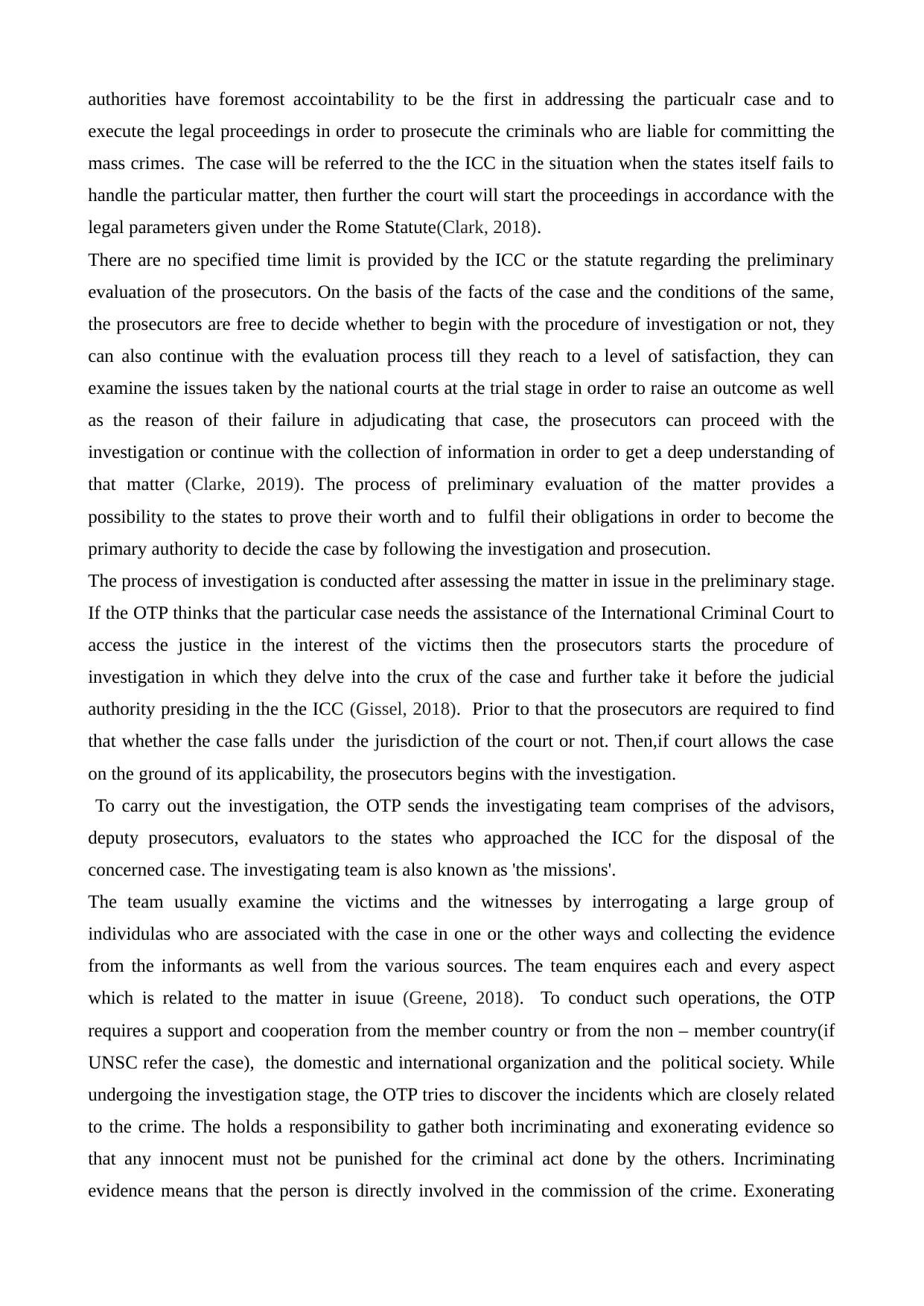
authorities have foremost accointability to be the first in addressing the particualr case and to
execute the legal proceedings in order to prosecute the criminals who are liable for committing the
mass crimes. The case will be referred to the the ICC in the situation when the states itself fails to
handle the particular matter, then further the court will start the proceedings in accordance with the
legal parameters given under the Rome Statute(Clark, 2018).
There are no specified time limit is provided by the ICC or the statute regarding the preliminary
evaluation of the prosecutors. On the basis of the facts of the case and the conditions of the same,
the prosecutors are free to decide whether to begin with the procedure of investigation or not, they
can also continue with the evaluation process till they reach to a level of satisfaction, they can
examine the issues taken by the national courts at the trial stage in order to raise an outcome as well
as the reason of their failure in adjudicating that case, the prosecutors can proceed with the
investigation or continue with the collection of information in order to get a deep understanding of
that matter (Clarke, 2019). The process of preliminary evaluation of the matter provides a
possibility to the states to prove their worth and to fulfil their obligations in order to become the
primary authority to decide the case by following the investigation and prosecution.
The process of investigation is conducted after assessing the matter in issue in the preliminary stage.
If the OTP thinks that the particular case needs the assistance of the International Criminal Court to
access the justice in the interest of the victims then the prosecutors starts the procedure of
investigation in which they delve into the crux of the case and further take it before the judicial
authority presiding in the the ICC (Gissel, 2018). Prior to that the prosecutors are required to find
that whether the case falls under the jurisdiction of the court or not. Then,if court allows the case
on the ground of its applicability, the prosecutors begins with the investigation.
To carry out the investigation, the OTP sends the investigating team comprises of the advisors,
deputy prosecutors, evaluators to the states who approached the ICC for the disposal of the
concerned case. The investigating team is also known as 'the missions'.
The team usually examine the victims and the witnesses by interrogating a large group of
individulas who are associated with the case in one or the other ways and collecting the evidence
from the informants as well from the various sources. The team enquires each and every aspect
which is related to the matter in isuue (Greene, 2018). To conduct such operations, the OTP
requires a support and cooperation from the member country or from the non – member country(if
UNSC refer the case), the domestic and international organization and the political society. While
undergoing the investigation stage, the OTP tries to discover the incidents which are closely related
to the crime. The holds a responsibility to gather both incriminating and exonerating evidence so
that any innocent must not be punished for the criminal act done by the others. Incriminating
evidence means that the person is directly involved in the commission of the crime. Exonerating
execute the legal proceedings in order to prosecute the criminals who are liable for committing the
mass crimes. The case will be referred to the the ICC in the situation when the states itself fails to
handle the particular matter, then further the court will start the proceedings in accordance with the
legal parameters given under the Rome Statute(Clark, 2018).
There are no specified time limit is provided by the ICC or the statute regarding the preliminary
evaluation of the prosecutors. On the basis of the facts of the case and the conditions of the same,
the prosecutors are free to decide whether to begin with the procedure of investigation or not, they
can also continue with the evaluation process till they reach to a level of satisfaction, they can
examine the issues taken by the national courts at the trial stage in order to raise an outcome as well
as the reason of their failure in adjudicating that case, the prosecutors can proceed with the
investigation or continue with the collection of information in order to get a deep understanding of
that matter (Clarke, 2019). The process of preliminary evaluation of the matter provides a
possibility to the states to prove their worth and to fulfil their obligations in order to become the
primary authority to decide the case by following the investigation and prosecution.
The process of investigation is conducted after assessing the matter in issue in the preliminary stage.
If the OTP thinks that the particular case needs the assistance of the International Criminal Court to
access the justice in the interest of the victims then the prosecutors starts the procedure of
investigation in which they delve into the crux of the case and further take it before the judicial
authority presiding in the the ICC (Gissel, 2018). Prior to that the prosecutors are required to find
that whether the case falls under the jurisdiction of the court or not. Then,if court allows the case
on the ground of its applicability, the prosecutors begins with the investigation.
To carry out the investigation, the OTP sends the investigating team comprises of the advisors,
deputy prosecutors, evaluators to the states who approached the ICC for the disposal of the
concerned case. The investigating team is also known as 'the missions'.
The team usually examine the victims and the witnesses by interrogating a large group of
individulas who are associated with the case in one or the other ways and collecting the evidence
from the informants as well from the various sources. The team enquires each and every aspect
which is related to the matter in isuue (Greene, 2018). To conduct such operations, the OTP
requires a support and cooperation from the member country or from the non – member country(if
UNSC refer the case), the domestic and international organization and the political society. While
undergoing the investigation stage, the OTP tries to discover the incidents which are closely related
to the crime. The holds a responsibility to gather both incriminating and exonerating evidence so
that any innocent must not be punished for the criminal act done by the others. Incriminating
evidence means that the person is directly involved in the commission of the crime. Exonerating
Paraphrase This Document
Need a fresh take? Get an instant paraphrase of this document with our AI Paraphraser
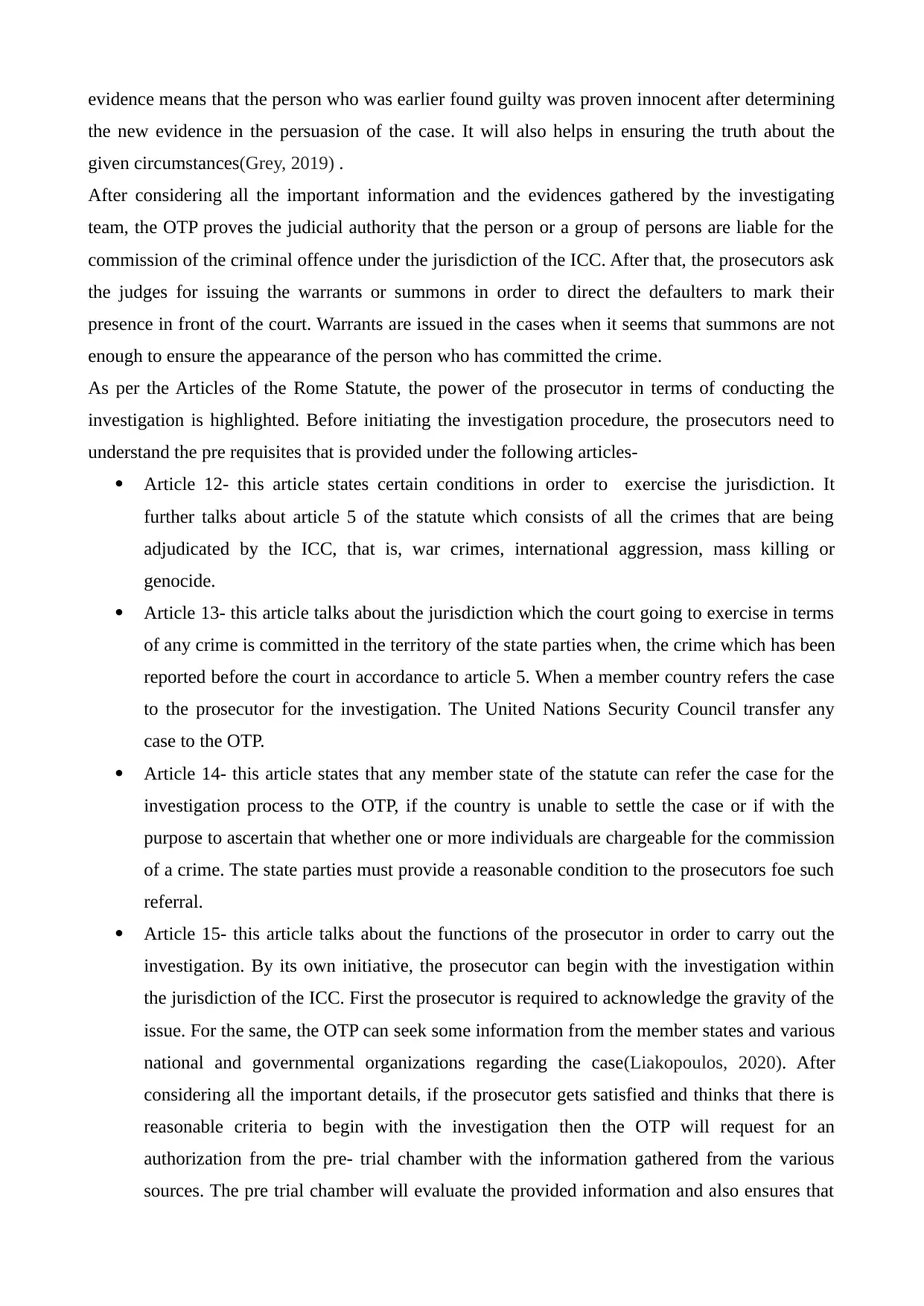
evidence means that the person who was earlier found guilty was proven innocent after determining
the new evidence in the persuasion of the case. It will also helps in ensuring the truth about the
given circumstances(Grey, 2019) .
After considering all the important information and the evidences gathered by the investigating
team, the OTP proves the judicial authority that the person or a group of persons are liable for the
commission of the criminal offence under the jurisdiction of the ICC. After that, the prosecutors ask
the judges for issuing the warrants or summons in order to direct the defaulters to mark their
presence in front of the court. Warrants are issued in the cases when it seems that summons are not
enough to ensure the appearance of the person who has committed the crime.
As per the Articles of the Rome Statute, the power of the prosecutor in terms of conducting the
investigation is highlighted. Before initiating the investigation procedure, the prosecutors need to
understand the pre requisites that is provided under the following articles-
Article 12- this article states certain conditions in order to exercise the jurisdiction. It
further talks about article 5 of the statute which consists of all the crimes that are being
adjudicated by the ICC, that is, war crimes, international aggression, mass killing or
genocide.
Article 13- this article talks about the jurisdiction which the court going to exercise in terms
of any crime is committed in the territory of the state parties when, the crime which has been
reported before the court in accordance to article 5. When a member country refers the case
to the prosecutor for the investigation. The United Nations Security Council transfer any
case to the OTP.
Article 14- this article states that any member state of the statute can refer the case for the
investigation process to the OTP, if the country is unable to settle the case or if with the
purpose to ascertain that whether one or more individuals are chargeable for the commission
of a crime. The state parties must provide a reasonable condition to the prosecutors foe such
referral.
Article 15- this article talks about the functions of the prosecutor in order to carry out the
investigation. By its own initiative, the prosecutor can begin with the investigation within
the jurisdiction of the ICC. First the prosecutor is required to acknowledge the gravity of the
issue. For the same, the OTP can seek some information from the member states and various
national and governmental organizations regarding the case(Liakopoulos, 2020). After
considering all the important details, if the prosecutor gets satisfied and thinks that there is
reasonable criteria to begin with the investigation then the OTP will request for an
authorization from the pre- trial chamber with the information gathered from the various
sources. The pre trial chamber will evaluate the provided information and also ensures that
the new evidence in the persuasion of the case. It will also helps in ensuring the truth about the
given circumstances(Grey, 2019) .
After considering all the important information and the evidences gathered by the investigating
team, the OTP proves the judicial authority that the person or a group of persons are liable for the
commission of the criminal offence under the jurisdiction of the ICC. After that, the prosecutors ask
the judges for issuing the warrants or summons in order to direct the defaulters to mark their
presence in front of the court. Warrants are issued in the cases when it seems that summons are not
enough to ensure the appearance of the person who has committed the crime.
As per the Articles of the Rome Statute, the power of the prosecutor in terms of conducting the
investigation is highlighted. Before initiating the investigation procedure, the prosecutors need to
understand the pre requisites that is provided under the following articles-
Article 12- this article states certain conditions in order to exercise the jurisdiction. It
further talks about article 5 of the statute which consists of all the crimes that are being
adjudicated by the ICC, that is, war crimes, international aggression, mass killing or
genocide.
Article 13- this article talks about the jurisdiction which the court going to exercise in terms
of any crime is committed in the territory of the state parties when, the crime which has been
reported before the court in accordance to article 5. When a member country refers the case
to the prosecutor for the investigation. The United Nations Security Council transfer any
case to the OTP.
Article 14- this article states that any member state of the statute can refer the case for the
investigation process to the OTP, if the country is unable to settle the case or if with the
purpose to ascertain that whether one or more individuals are chargeable for the commission
of a crime. The state parties must provide a reasonable condition to the prosecutors foe such
referral.
Article 15- this article talks about the functions of the prosecutor in order to carry out the
investigation. By its own initiative, the prosecutor can begin with the investigation within
the jurisdiction of the ICC. First the prosecutor is required to acknowledge the gravity of the
issue. For the same, the OTP can seek some information from the member states and various
national and governmental organizations regarding the case(Liakopoulos, 2020). After
considering all the important details, if the prosecutor gets satisfied and thinks that there is
reasonable criteria to begin with the investigation then the OTP will request for an
authorization from the pre- trial chamber with the information gathered from the various
sources. The pre trial chamber will evaluate the provided information and also ensures that
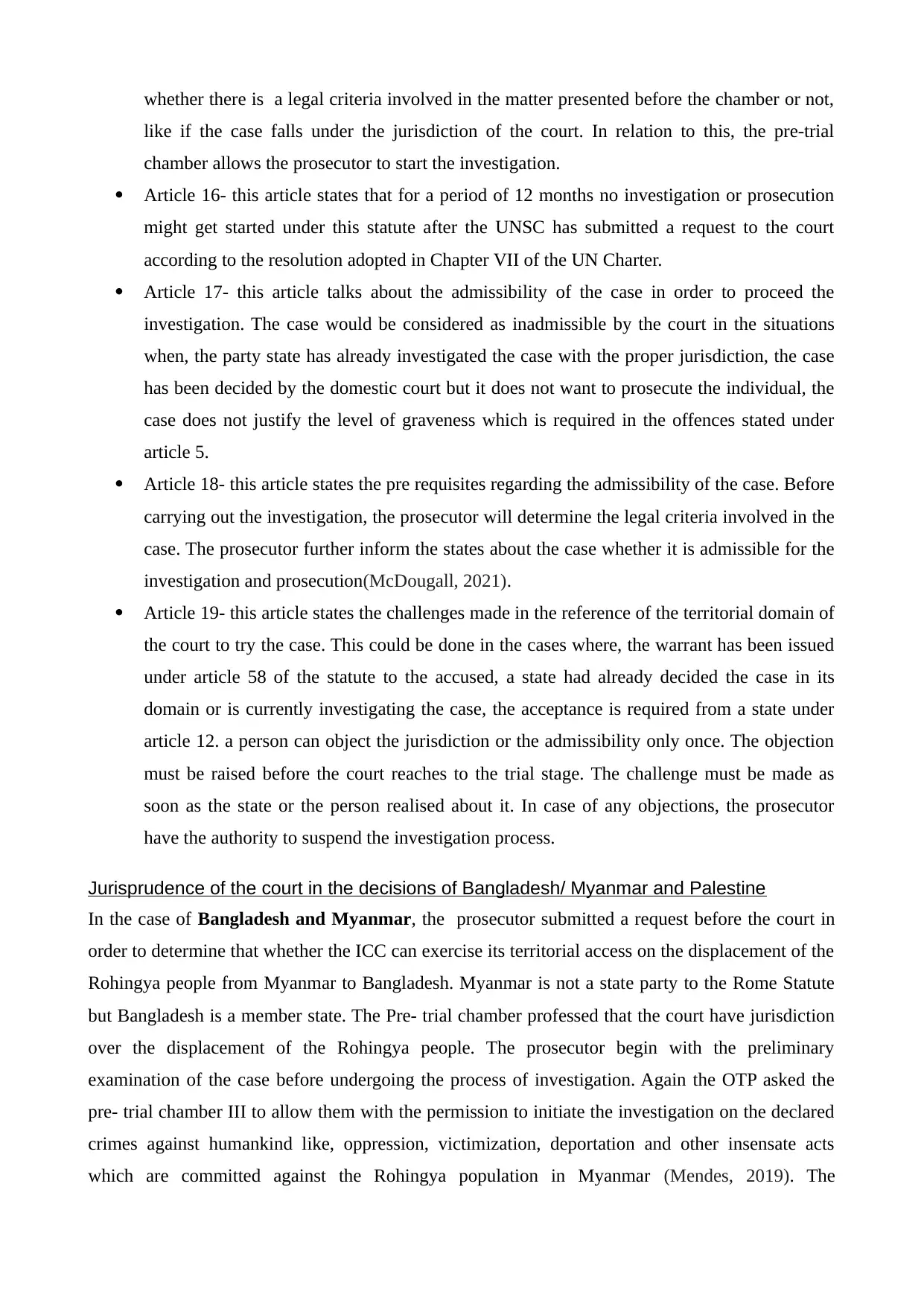
whether there is a legal criteria involved in the matter presented before the chamber or not,
like if the case falls under the jurisdiction of the court. In relation to this, the pre-trial
chamber allows the prosecutor to start the investigation.
Article 16- this article states that for a period of 12 months no investigation or prosecution
might get started under this statute after the UNSC has submitted a request to the court
according to the resolution adopted in Chapter VII of the UN Charter.
Article 17- this article talks about the admissibility of the case in order to proceed the
investigation. The case would be considered as inadmissible by the court in the situations
when, the party state has already investigated the case with the proper jurisdiction, the case
has been decided by the domestic court but it does not want to prosecute the individual, the
case does not justify the level of graveness which is required in the offences stated under
article 5.
Article 18- this article states the pre requisites regarding the admissibility of the case. Before
carrying out the investigation, the prosecutor will determine the legal criteria involved in the
case. The prosecutor further inform the states about the case whether it is admissible for the
investigation and prosecution(McDougall, 2021).
Article 19- this article states the challenges made in the reference of the territorial domain of
the court to try the case. This could be done in the cases where, the warrant has been issued
under article 58 of the statute to the accused, a state had already decided the case in its
domain or is currently investigating the case, the acceptance is required from a state under
article 12. a person can object the jurisdiction or the admissibility only once. The objection
must be raised before the court reaches to the trial stage. The challenge must be made as
soon as the state or the person realised about it. In case of any objections, the prosecutor
have the authority to suspend the investigation process.
Jurisprudence of the court in the decisions of Bangladesh/ Myanmar and Palestine
In the case of Bangladesh and Myanmar, the prosecutor submitted a request before the court in
order to determine that whether the ICC can exercise its territorial access on the displacement of the
Rohingya people from Myanmar to Bangladesh. Myanmar is not a state party to the Rome Statute
but Bangladesh is a member state. The Pre- trial chamber professed that the court have jurisdiction
over the displacement of the Rohingya people. The prosecutor begin with the preliminary
examination of the case before undergoing the process of investigation. Again the OTP asked the
pre- trial chamber III to allow them with the permission to initiate the investigation on the declared
crimes against humankind like, oppression, victimization, deportation and other insensate acts
which are committed against the Rohingya population in Myanmar (Mendes, 2019). The
like if the case falls under the jurisdiction of the court. In relation to this, the pre-trial
chamber allows the prosecutor to start the investigation.
Article 16- this article states that for a period of 12 months no investigation or prosecution
might get started under this statute after the UNSC has submitted a request to the court
according to the resolution adopted in Chapter VII of the UN Charter.
Article 17- this article talks about the admissibility of the case in order to proceed the
investigation. The case would be considered as inadmissible by the court in the situations
when, the party state has already investigated the case with the proper jurisdiction, the case
has been decided by the domestic court but it does not want to prosecute the individual, the
case does not justify the level of graveness which is required in the offences stated under
article 5.
Article 18- this article states the pre requisites regarding the admissibility of the case. Before
carrying out the investigation, the prosecutor will determine the legal criteria involved in the
case. The prosecutor further inform the states about the case whether it is admissible for the
investigation and prosecution(McDougall, 2021).
Article 19- this article states the challenges made in the reference of the territorial domain of
the court to try the case. This could be done in the cases where, the warrant has been issued
under article 58 of the statute to the accused, a state had already decided the case in its
domain or is currently investigating the case, the acceptance is required from a state under
article 12. a person can object the jurisdiction or the admissibility only once. The objection
must be raised before the court reaches to the trial stage. The challenge must be made as
soon as the state or the person realised about it. In case of any objections, the prosecutor
have the authority to suspend the investigation process.
Jurisprudence of the court in the decisions of Bangladesh/ Myanmar and Palestine
In the case of Bangladesh and Myanmar, the prosecutor submitted a request before the court in
order to determine that whether the ICC can exercise its territorial access on the displacement of the
Rohingya people from Myanmar to Bangladesh. Myanmar is not a state party to the Rome Statute
but Bangladesh is a member state. The Pre- trial chamber professed that the court have jurisdiction
over the displacement of the Rohingya people. The prosecutor begin with the preliminary
examination of the case before undergoing the process of investigation. Again the OTP asked the
pre- trial chamber III to allow them with the permission to initiate the investigation on the declared
crimes against humankind like, oppression, victimization, deportation and other insensate acts
which are committed against the Rohingya population in Myanmar (Mendes, 2019). The
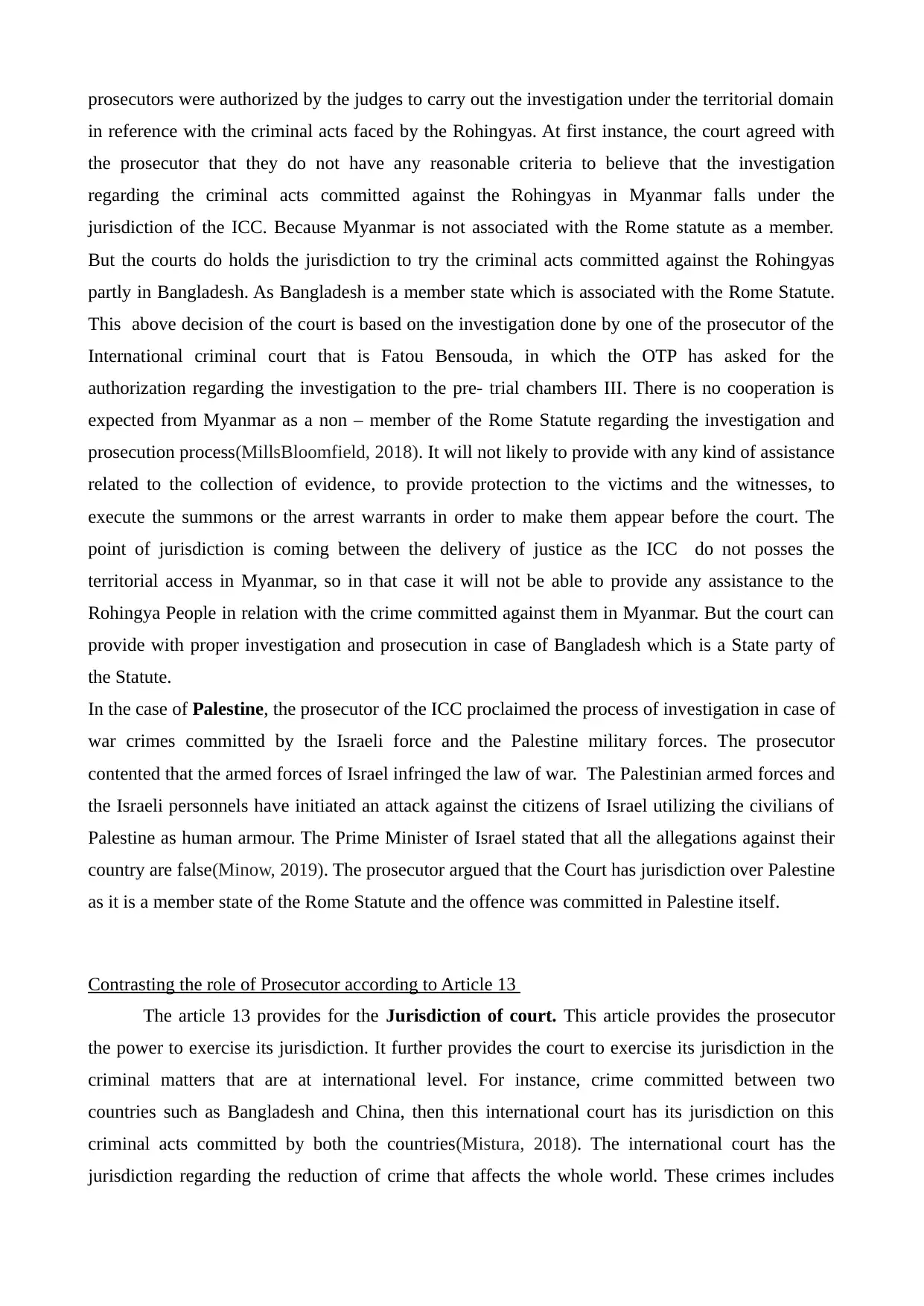
prosecutors were authorized by the judges to carry out the investigation under the territorial domain
in reference with the criminal acts faced by the Rohingyas. At first instance, the court agreed with
the prosecutor that they do not have any reasonable criteria to believe that the investigation
regarding the criminal acts committed against the Rohingyas in Myanmar falls under the
jurisdiction of the ICC. Because Myanmar is not associated with the Rome statute as a member.
But the courts do holds the jurisdiction to try the criminal acts committed against the Rohingyas
partly in Bangladesh. As Bangladesh is a member state which is associated with the Rome Statute.
This above decision of the court is based on the investigation done by one of the prosecutor of the
International criminal court that is Fatou Bensouda, in which the OTP has asked for the
authorization regarding the investigation to the pre- trial chambers III. There is no cooperation is
expected from Myanmar as a non – member of the Rome Statute regarding the investigation and
prosecution process(MillsBloomfield, 2018). It will not likely to provide with any kind of assistance
related to the collection of evidence, to provide protection to the victims and the witnesses, to
execute the summons or the arrest warrants in order to make them appear before the court. The
point of jurisdiction is coming between the delivery of justice as the ICC do not posses the
territorial access in Myanmar, so in that case it will not be able to provide any assistance to the
Rohingya People in relation with the crime committed against them in Myanmar. But the court can
provide with proper investigation and prosecution in case of Bangladesh which is a State party of
the Statute.
In the case of Palestine, the prosecutor of the ICC proclaimed the process of investigation in case of
war crimes committed by the Israeli force and the Palestine military forces. The prosecutor
contented that the armed forces of Israel infringed the law of war. The Palestinian armed forces and
the Israeli personnels have initiated an attack against the citizens of Israel utilizing the civilians of
Palestine as human armour. The Prime Minister of Israel stated that all the allegations against their
country are false(Minow, 2019). The prosecutor argued that the Court has jurisdiction over Palestine
as it is a member state of the Rome Statute and the offence was committed in Palestine itself.
Contrasting the role of Prosecutor according to Article 13
The article 13 provides for the Jurisdiction of court. This article provides the prosecutor
the power to exercise its jurisdiction. It further provides the court to exercise its jurisdiction in the
criminal matters that are at international level. For instance, crime committed between two
countries such as Bangladesh and China, then this international court has its jurisdiction on this
criminal acts committed by both the countries(Mistura, 2018). The international court has the
jurisdiction regarding the reduction of crime that affects the whole world. These crimes includes
in reference with the criminal acts faced by the Rohingyas. At first instance, the court agreed with
the prosecutor that they do not have any reasonable criteria to believe that the investigation
regarding the criminal acts committed against the Rohingyas in Myanmar falls under the
jurisdiction of the ICC. Because Myanmar is not associated with the Rome statute as a member.
But the courts do holds the jurisdiction to try the criminal acts committed against the Rohingyas
partly in Bangladesh. As Bangladesh is a member state which is associated with the Rome Statute.
This above decision of the court is based on the investigation done by one of the prosecutor of the
International criminal court that is Fatou Bensouda, in which the OTP has asked for the
authorization regarding the investigation to the pre- trial chambers III. There is no cooperation is
expected from Myanmar as a non – member of the Rome Statute regarding the investigation and
prosecution process(MillsBloomfield, 2018). It will not likely to provide with any kind of assistance
related to the collection of evidence, to provide protection to the victims and the witnesses, to
execute the summons or the arrest warrants in order to make them appear before the court. The
point of jurisdiction is coming between the delivery of justice as the ICC do not posses the
territorial access in Myanmar, so in that case it will not be able to provide any assistance to the
Rohingya People in relation with the crime committed against them in Myanmar. But the court can
provide with proper investigation and prosecution in case of Bangladesh which is a State party of
the Statute.
In the case of Palestine, the prosecutor of the ICC proclaimed the process of investigation in case of
war crimes committed by the Israeli force and the Palestine military forces. The prosecutor
contented that the armed forces of Israel infringed the law of war. The Palestinian armed forces and
the Israeli personnels have initiated an attack against the citizens of Israel utilizing the civilians of
Palestine as human armour. The Prime Minister of Israel stated that all the allegations against their
country are false(Minow, 2019). The prosecutor argued that the Court has jurisdiction over Palestine
as it is a member state of the Rome Statute and the offence was committed in Palestine itself.
Contrasting the role of Prosecutor according to Article 13
The article 13 provides for the Jurisdiction of court. This article provides the prosecutor
the power to exercise its jurisdiction. It further provides the court to exercise its jurisdiction in the
criminal matters that are at international level. For instance, crime committed between two
countries such as Bangladesh and China, then this international court has its jurisdiction on this
criminal acts committed by both the countries(Mistura, 2018). The international court has the
jurisdiction regarding the reduction of crime that affects the whole world. These crimes includes
Secure Best Marks with AI Grader
Need help grading? Try our AI Grader for instant feedback on your assignments.
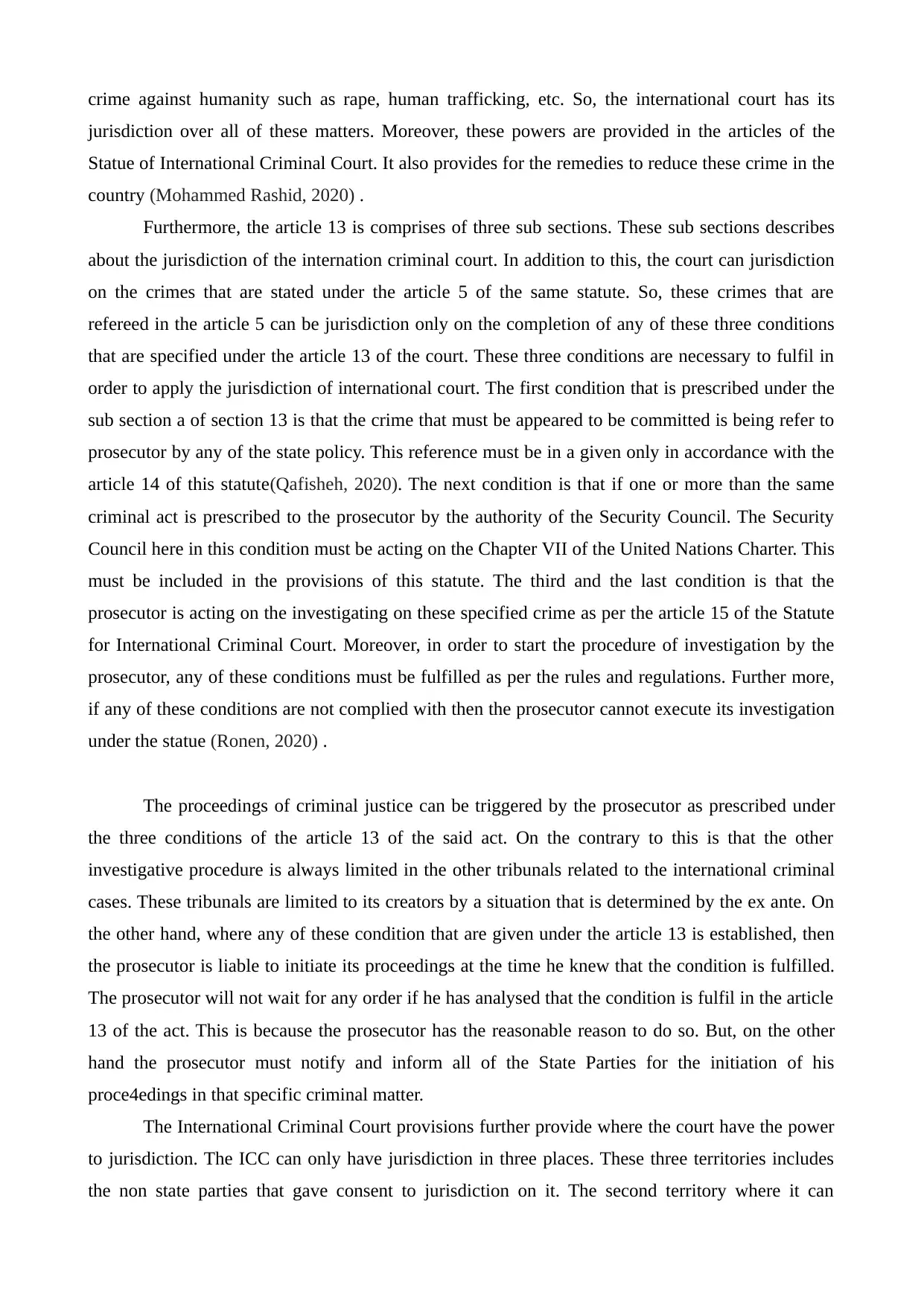
crime against humanity such as rape, human trafficking, etc. So, the international court has its
jurisdiction over all of these matters. Moreover, these powers are provided in the articles of the
Statue of International Criminal Court. It also provides for the remedies to reduce these crime in the
country (Mohammed Rashid, 2020) .
Furthermore, the article 13 is comprises of three sub sections. These sub sections describes
about the jurisdiction of the internation criminal court. In addition to this, the court can jurisdiction
on the crimes that are stated under the article 5 of the same statute. So, these crimes that are
refereed in the article 5 can be jurisdiction only on the completion of any of these three conditions
that are specified under the article 13 of the court. These three conditions are necessary to fulfil in
order to apply the jurisdiction of international court. The first condition that is prescribed under the
sub section a of section 13 is that the crime that must be appeared to be committed is being refer to
prosecutor by any of the state policy. This reference must be in a given only in accordance with the
article 14 of this statute(Qafisheh, 2020). The next condition is that if one or more than the same
criminal act is prescribed to the prosecutor by the authority of the Security Council. The Security
Council here in this condition must be acting on the Chapter VII of the United Nations Charter. This
must be included in the provisions of this statute. The third and the last condition is that the
prosecutor is acting on the investigating on these specified crime as per the article 15 of the Statute
for International Criminal Court. Moreover, in order to start the procedure of investigation by the
prosecutor, any of these conditions must be fulfilled as per the rules and regulations. Further more,
if any of these conditions are not complied with then the prosecutor cannot execute its investigation
under the statue (Ronen, 2020) .
The proceedings of criminal justice can be triggered by the prosecutor as prescribed under
the three conditions of the article 13 of the said act. On the contrary to this is that the other
investigative procedure is always limited in the other tribunals related to the international criminal
cases. These tribunals are limited to its creators by a situation that is determined by the ex ante. On
the other hand, where any of these condition that are given under the article 13 is established, then
the prosecutor is liable to initiate its proceedings at the time he knew that the condition is fulfilled.
The prosecutor will not wait for any order if he has analysed that the condition is fulfil in the article
13 of the act. This is because the prosecutor has the reasonable reason to do so. But, on the other
hand the prosecutor must notify and inform all of the State Parties for the initiation of his
proce4edings in that specific criminal matter.
The International Criminal Court provisions further provide where the court have the power
to jurisdiction. The ICC can only have jurisdiction in three places. These three territories includes
the non state parties that gave consent to jurisdiction on it. The second territory where it can
jurisdiction over all of these matters. Moreover, these powers are provided in the articles of the
Statue of International Criminal Court. It also provides for the remedies to reduce these crime in the
country (Mohammed Rashid, 2020) .
Furthermore, the article 13 is comprises of three sub sections. These sub sections describes
about the jurisdiction of the internation criminal court. In addition to this, the court can jurisdiction
on the crimes that are stated under the article 5 of the same statute. So, these crimes that are
refereed in the article 5 can be jurisdiction only on the completion of any of these three conditions
that are specified under the article 13 of the court. These three conditions are necessary to fulfil in
order to apply the jurisdiction of international court. The first condition that is prescribed under the
sub section a of section 13 is that the crime that must be appeared to be committed is being refer to
prosecutor by any of the state policy. This reference must be in a given only in accordance with the
article 14 of this statute(Qafisheh, 2020). The next condition is that if one or more than the same
criminal act is prescribed to the prosecutor by the authority of the Security Council. The Security
Council here in this condition must be acting on the Chapter VII of the United Nations Charter. This
must be included in the provisions of this statute. The third and the last condition is that the
prosecutor is acting on the investigating on these specified crime as per the article 15 of the Statute
for International Criminal Court. Moreover, in order to start the procedure of investigation by the
prosecutor, any of these conditions must be fulfilled as per the rules and regulations. Further more,
if any of these conditions are not complied with then the prosecutor cannot execute its investigation
under the statue (Ronen, 2020) .
The proceedings of criminal justice can be triggered by the prosecutor as prescribed under
the three conditions of the article 13 of the said act. On the contrary to this is that the other
investigative procedure is always limited in the other tribunals related to the international criminal
cases. These tribunals are limited to its creators by a situation that is determined by the ex ante. On
the other hand, where any of these condition that are given under the article 13 is established, then
the prosecutor is liable to initiate its proceedings at the time he knew that the condition is fulfilled.
The prosecutor will not wait for any order if he has analysed that the condition is fulfil in the article
13 of the act. This is because the prosecutor has the reasonable reason to do so. But, on the other
hand the prosecutor must notify and inform all of the State Parties for the initiation of his
proce4edings in that specific criminal matter.
The International Criminal Court provisions further provide where the court have the power
to jurisdiction. The ICC can only have jurisdiction in three places. These three territories includes
the non state parties that gave consent to jurisdiction on it. The second territory where it can
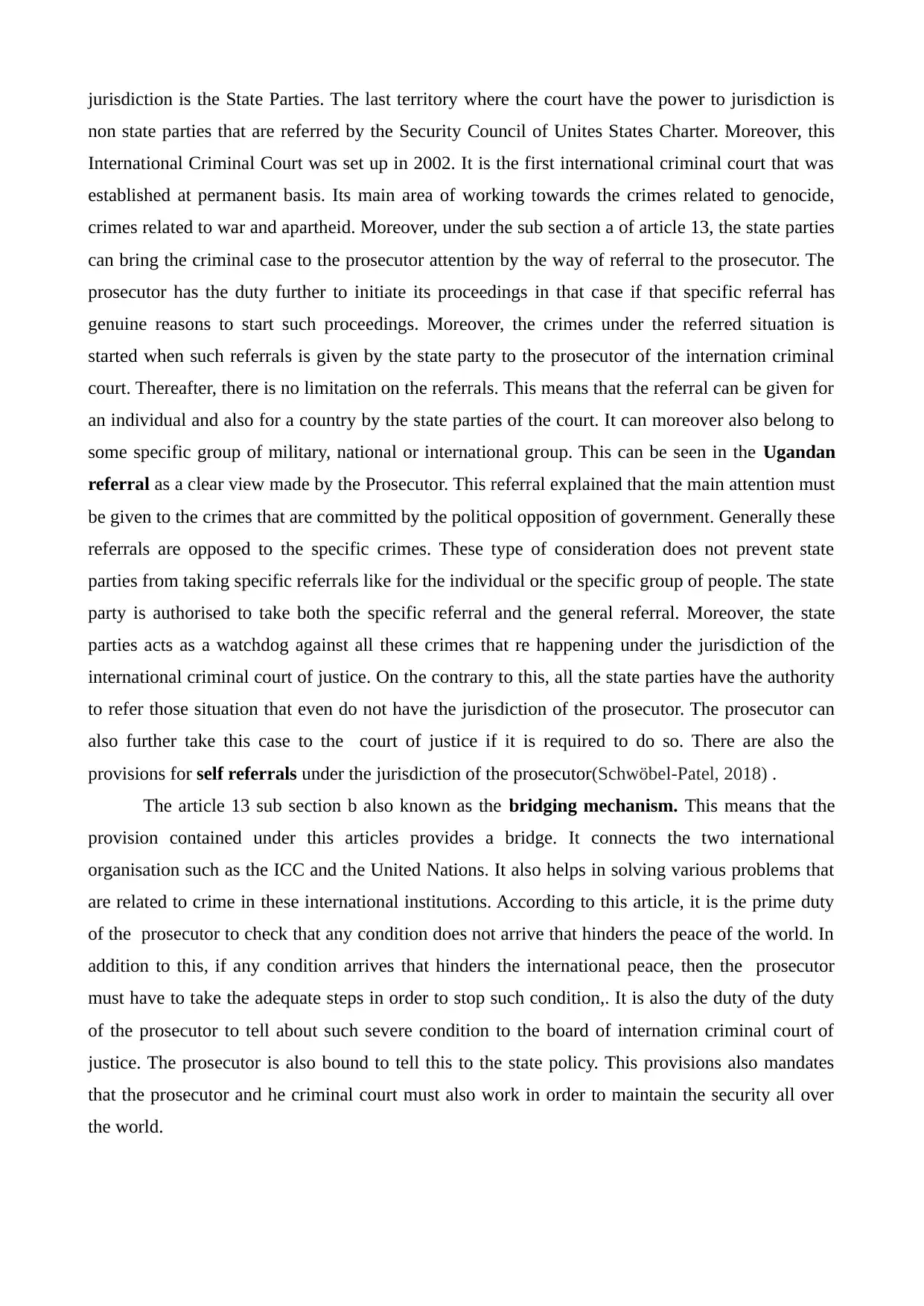
jurisdiction is the State Parties. The last territory where the court have the power to jurisdiction is
non state parties that are referred by the Security Council of Unites States Charter. Moreover, this
International Criminal Court was set up in 2002. It is the first international criminal court that was
established at permanent basis. Its main area of working towards the crimes related to genocide,
crimes related to war and apartheid. Moreover, under the sub section a of article 13, the state parties
can bring the criminal case to the prosecutor attention by the way of referral to the prosecutor. The
prosecutor has the duty further to initiate its proceedings in that case if that specific referral has
genuine reasons to start such proceedings. Moreover, the crimes under the referred situation is
started when such referrals is given by the state party to the prosecutor of the internation criminal
court. Thereafter, there is no limitation on the referrals. This means that the referral can be given for
an individual and also for a country by the state parties of the court. It can moreover also belong to
some specific group of military, national or international group. This can be seen in the Ugandan
referral as a clear view made by the Prosecutor. This referral explained that the main attention must
be given to the crimes that are committed by the political opposition of government. Generally these
referrals are opposed to the specific crimes. These type of consideration does not prevent state
parties from taking specific referrals like for the individual or the specific group of people. The state
party is authorised to take both the specific referral and the general referral. Moreover, the state
parties acts as a watchdog against all these crimes that re happening under the jurisdiction of the
international criminal court of justice. On the contrary to this, all the state parties have the authority
to refer those situation that even do not have the jurisdiction of the prosecutor. The prosecutor can
also further take this case to the court of justice if it is required to do so. There are also the
provisions for self referrals under the jurisdiction of the prosecutor(Schwöbel-Patel, 2018) .
The article 13 sub section b also known as the bridging mechanism. This means that the
provision contained under this articles provides a bridge. It connects the two international
organisation such as the ICC and the United Nations. It also helps in solving various problems that
are related to crime in these international institutions. According to this article, it is the prime duty
of the prosecutor to check that any condition does not arrive that hinders the peace of the world. In
addition to this, if any condition arrives that hinders the international peace, then the prosecutor
must have to take the adequate steps in order to stop such condition,. It is also the duty of the duty
of the prosecutor to tell about such severe condition to the board of internation criminal court of
justice. The prosecutor is also bound to tell this to the state policy. This provisions also mandates
that the prosecutor and he criminal court must also work in order to maintain the security all over
the world.
non state parties that are referred by the Security Council of Unites States Charter. Moreover, this
International Criminal Court was set up in 2002. It is the first international criminal court that was
established at permanent basis. Its main area of working towards the crimes related to genocide,
crimes related to war and apartheid. Moreover, under the sub section a of article 13, the state parties
can bring the criminal case to the prosecutor attention by the way of referral to the prosecutor. The
prosecutor has the duty further to initiate its proceedings in that case if that specific referral has
genuine reasons to start such proceedings. Moreover, the crimes under the referred situation is
started when such referrals is given by the state party to the prosecutor of the internation criminal
court. Thereafter, there is no limitation on the referrals. This means that the referral can be given for
an individual and also for a country by the state parties of the court. It can moreover also belong to
some specific group of military, national or international group. This can be seen in the Ugandan
referral as a clear view made by the Prosecutor. This referral explained that the main attention must
be given to the crimes that are committed by the political opposition of government. Generally these
referrals are opposed to the specific crimes. These type of consideration does not prevent state
parties from taking specific referrals like for the individual or the specific group of people. The state
party is authorised to take both the specific referral and the general referral. Moreover, the state
parties acts as a watchdog against all these crimes that re happening under the jurisdiction of the
international criminal court of justice. On the contrary to this, all the state parties have the authority
to refer those situation that even do not have the jurisdiction of the prosecutor. The prosecutor can
also further take this case to the court of justice if it is required to do so. There are also the
provisions for self referrals under the jurisdiction of the prosecutor(Schwöbel-Patel, 2018) .
The article 13 sub section b also known as the bridging mechanism. This means that the
provision contained under this articles provides a bridge. It connects the two international
organisation such as the ICC and the United Nations. It also helps in solving various problems that
are related to crime in these international institutions. According to this article, it is the prime duty
of the prosecutor to check that any condition does not arrive that hinders the peace of the world. In
addition to this, if any condition arrives that hinders the international peace, then the prosecutor
must have to take the adequate steps in order to stop such condition,. It is also the duty of the duty
of the prosecutor to tell about such severe condition to the board of internation criminal court of
justice. The prosecutor is also bound to tell this to the state policy. This provisions also mandates
that the prosecutor and he criminal court must also work in order to maintain the security all over
the world.
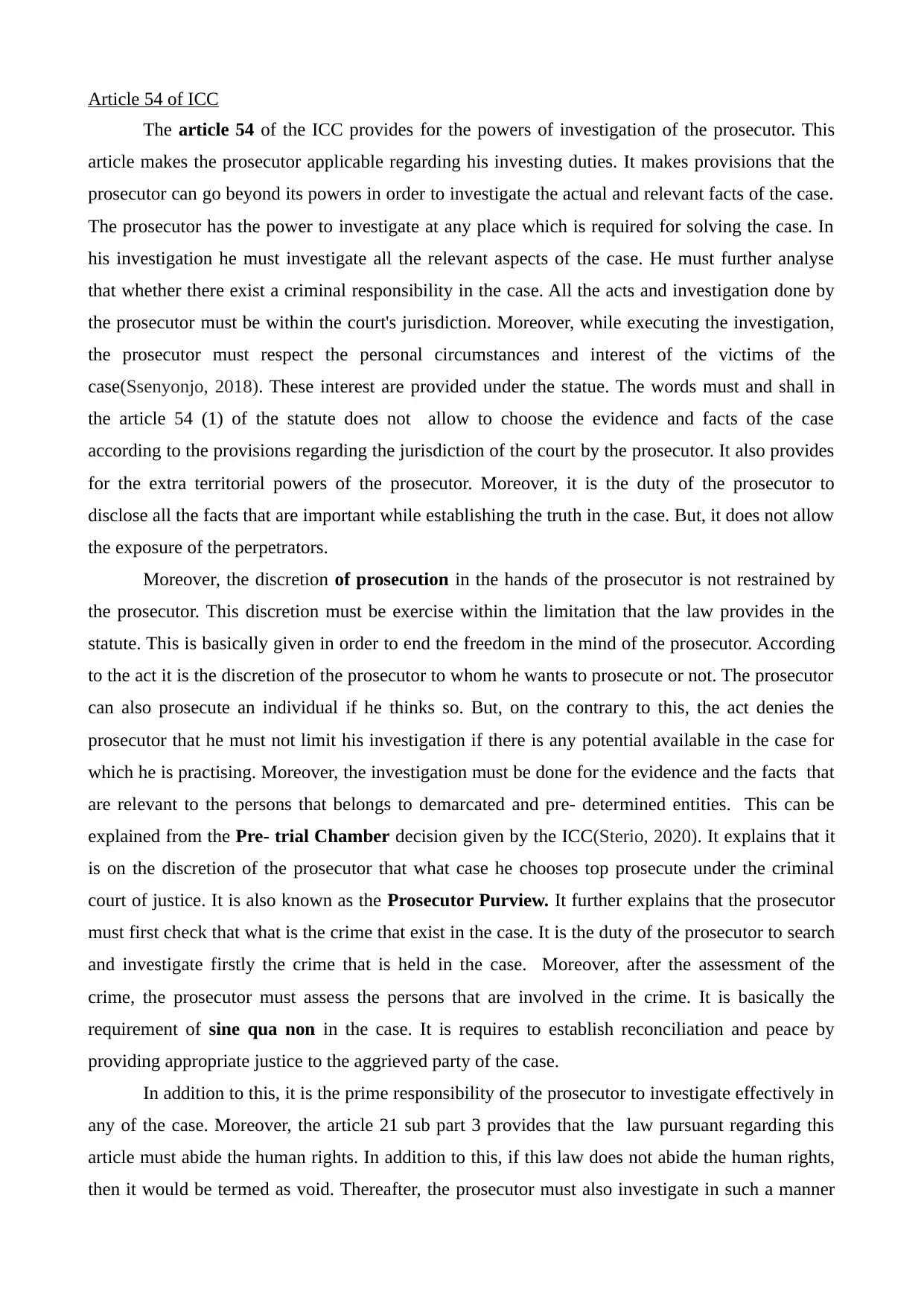
Article 54 of ICC
The article 54 of the ICC provides for the powers of investigation of the prosecutor. This
article makes the prosecutor applicable regarding his investing duties. It makes provisions that the
prosecutor can go beyond its powers in order to investigate the actual and relevant facts of the case.
The prosecutor has the power to investigate at any place which is required for solving the case. In
his investigation he must investigate all the relevant aspects of the case. He must further analyse
that whether there exist a criminal responsibility in the case. All the acts and investigation done by
the prosecutor must be within the court's jurisdiction. Moreover, while executing the investigation,
the prosecutor must respect the personal circumstances and interest of the victims of the
case(Ssenyonjo, 2018). These interest are provided under the statue. The words must and shall in
the article 54 (1) of the statute does not allow to choose the evidence and facts of the case
according to the provisions regarding the jurisdiction of the court by the prosecutor. It also provides
for the extra territorial powers of the prosecutor. Moreover, it is the duty of the prosecutor to
disclose all the facts that are important while establishing the truth in the case. But, it does not allow
the exposure of the perpetrators.
Moreover, the discretion of prosecution in the hands of the prosecutor is not restrained by
the prosecutor. This discretion must be exercise within the limitation that the law provides in the
statute. This is basically given in order to end the freedom in the mind of the prosecutor. According
to the act it is the discretion of the prosecutor to whom he wants to prosecute or not. The prosecutor
can also prosecute an individual if he thinks so. But, on the contrary to this, the act denies the
prosecutor that he must not limit his investigation if there is any potential available in the case for
which he is practising. Moreover, the investigation must be done for the evidence and the facts that
are relevant to the persons that belongs to demarcated and pre- determined entities. This can be
explained from the Pre- trial Chamber decision given by the ICC(Sterio, 2020). It explains that it
is on the discretion of the prosecutor that what case he chooses top prosecute under the criminal
court of justice. It is also known as the Prosecutor Purview. It further explains that the prosecutor
must first check that what is the crime that exist in the case. It is the duty of the prosecutor to search
and investigate firstly the crime that is held in the case. Moreover, after the assessment of the
crime, the prosecutor must assess the persons that are involved in the crime. It is basically the
requirement of sine qua non in the case. It is requires to establish reconciliation and peace by
providing appropriate justice to the aggrieved party of the case.
In addition to this, it is the prime responsibility of the prosecutor to investigate effectively in
any of the case. Moreover, the article 21 sub part 3 provides that the law pursuant regarding this
article must abide the human rights. In addition to this, if this law does not abide the human rights,
then it would be termed as void. Thereafter, the prosecutor must also investigate in such a manner
The article 54 of the ICC provides for the powers of investigation of the prosecutor. This
article makes the prosecutor applicable regarding his investing duties. It makes provisions that the
prosecutor can go beyond its powers in order to investigate the actual and relevant facts of the case.
The prosecutor has the power to investigate at any place which is required for solving the case. In
his investigation he must investigate all the relevant aspects of the case. He must further analyse
that whether there exist a criminal responsibility in the case. All the acts and investigation done by
the prosecutor must be within the court's jurisdiction. Moreover, while executing the investigation,
the prosecutor must respect the personal circumstances and interest of the victims of the
case(Ssenyonjo, 2018). These interest are provided under the statue. The words must and shall in
the article 54 (1) of the statute does not allow to choose the evidence and facts of the case
according to the provisions regarding the jurisdiction of the court by the prosecutor. It also provides
for the extra territorial powers of the prosecutor. Moreover, it is the duty of the prosecutor to
disclose all the facts that are important while establishing the truth in the case. But, it does not allow
the exposure of the perpetrators.
Moreover, the discretion of prosecution in the hands of the prosecutor is not restrained by
the prosecutor. This discretion must be exercise within the limitation that the law provides in the
statute. This is basically given in order to end the freedom in the mind of the prosecutor. According
to the act it is the discretion of the prosecutor to whom he wants to prosecute or not. The prosecutor
can also prosecute an individual if he thinks so. But, on the contrary to this, the act denies the
prosecutor that he must not limit his investigation if there is any potential available in the case for
which he is practising. Moreover, the investigation must be done for the evidence and the facts that
are relevant to the persons that belongs to demarcated and pre- determined entities. This can be
explained from the Pre- trial Chamber decision given by the ICC(Sterio, 2020). It explains that it
is on the discretion of the prosecutor that what case he chooses top prosecute under the criminal
court of justice. It is also known as the Prosecutor Purview. It further explains that the prosecutor
must first check that what is the crime that exist in the case. It is the duty of the prosecutor to search
and investigate firstly the crime that is held in the case. Moreover, after the assessment of the
crime, the prosecutor must assess the persons that are involved in the crime. It is basically the
requirement of sine qua non in the case. It is requires to establish reconciliation and peace by
providing appropriate justice to the aggrieved party of the case.
In addition to this, it is the prime responsibility of the prosecutor to investigate effectively in
any of the case. Moreover, the article 21 sub part 3 provides that the law pursuant regarding this
article must abide the human rights. In addition to this, if this law does not abide the human rights,
then it would be termed as void. Thereafter, the prosecutor must also investigate in such a manner
Paraphrase This Document
Need a fresh take? Get an instant paraphrase of this document with our AI Paraphraser
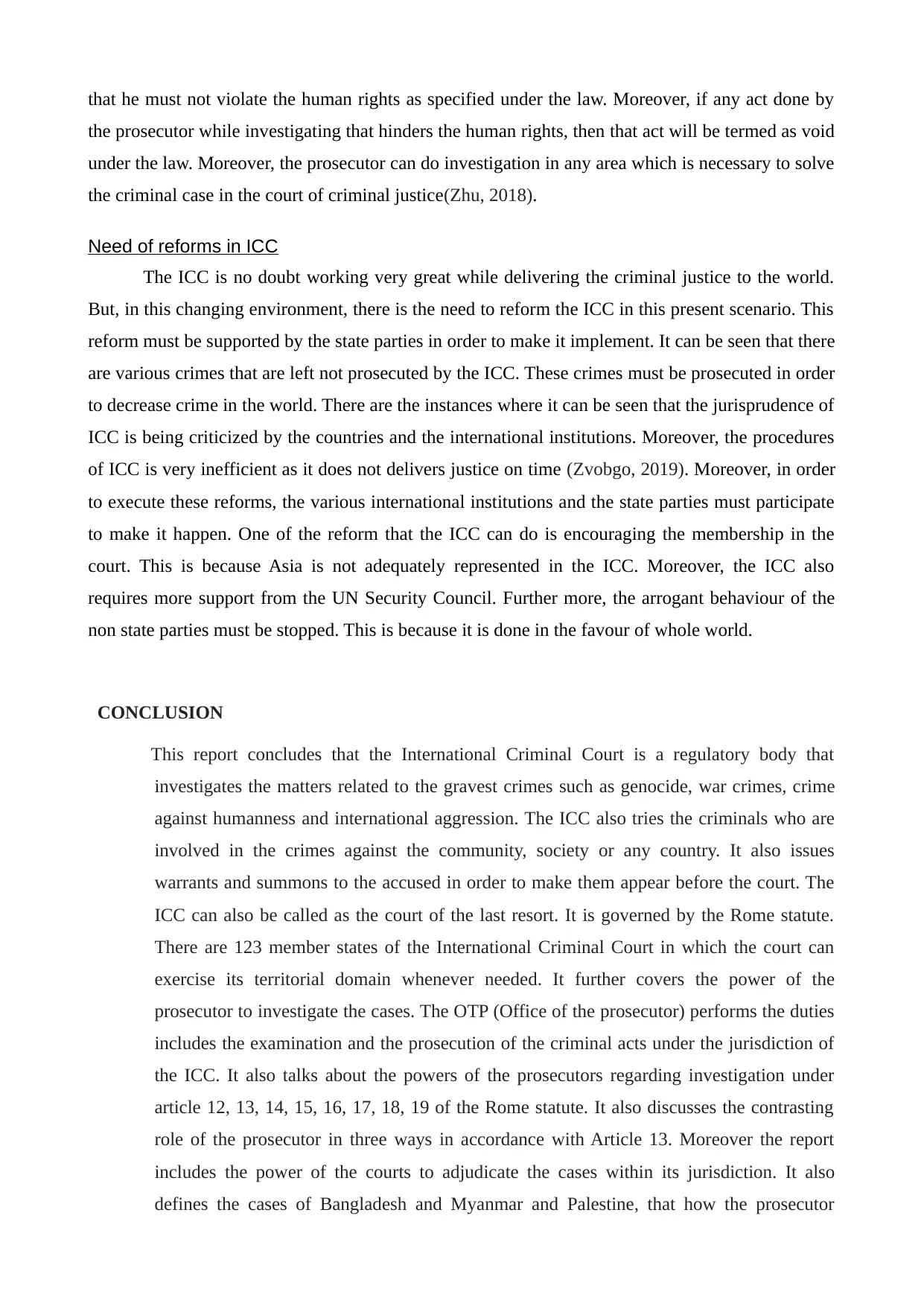
that he must not violate the human rights as specified under the law. Moreover, if any act done by
the prosecutor while investigating that hinders the human rights, then that act will be termed as void
under the law. Moreover, the prosecutor can do investigation in any area which is necessary to solve
the criminal case in the court of criminal justice(Zhu, 2018).
Need of reforms in ICC
The ICC is no doubt working very great while delivering the criminal justice to the world.
But, in this changing environment, there is the need to reform the ICC in this present scenario. This
reform must be supported by the state parties in order to make it implement. It can be seen that there
are various crimes that are left not prosecuted by the ICC. These crimes must be prosecuted in order
to decrease crime in the world. There are the instances where it can be seen that the jurisprudence of
ICC is being criticized by the countries and the international institutions. Moreover, the procedures
of ICC is very inefficient as it does not delivers justice on time (Zvobgo, 2019). Moreover, in order
to execute these reforms, the various international institutions and the state parties must participate
to make it happen. One of the reform that the ICC can do is encouraging the membership in the
court. This is because Asia is not adequately represented in the ICC. Moreover, the ICC also
requires more support from the UN Security Council. Further more, the arrogant behaviour of the
non state parties must be stopped. This is because it is done in the favour of whole world.
CONCLUSION
This report concludes that the International Criminal Court is a regulatory body that
investigates the matters related to the gravest crimes such as genocide, war crimes, crime
against humanness and international aggression. The ICC also tries the criminals who are
involved in the crimes against the community, society or any country. It also issues
warrants and summons to the accused in order to make them appear before the court. The
ICC can also be called as the court of the last resort. It is governed by the Rome statute.
There are 123 member states of the International Criminal Court in which the court can
exercise its territorial domain whenever needed. It further covers the power of the
prosecutor to investigate the cases. The OTP (Office of the prosecutor) performs the duties
includes the examination and the prosecution of the criminal acts under the jurisdiction of
the ICC. It also talks about the powers of the prosecutors regarding investigation under
article 12, 13, 14, 15, 16, 17, 18, 19 of the Rome statute. It also discusses the contrasting
role of the prosecutor in three ways in accordance with Article 13. Moreover the report
includes the power of the courts to adjudicate the cases within its jurisdiction. It also
defines the cases of Bangladesh and Myanmar and Palestine, that how the prosecutor
the prosecutor while investigating that hinders the human rights, then that act will be termed as void
under the law. Moreover, the prosecutor can do investigation in any area which is necessary to solve
the criminal case in the court of criminal justice(Zhu, 2018).
Need of reforms in ICC
The ICC is no doubt working very great while delivering the criminal justice to the world.
But, in this changing environment, there is the need to reform the ICC in this present scenario. This
reform must be supported by the state parties in order to make it implement. It can be seen that there
are various crimes that are left not prosecuted by the ICC. These crimes must be prosecuted in order
to decrease crime in the world. There are the instances where it can be seen that the jurisprudence of
ICC is being criticized by the countries and the international institutions. Moreover, the procedures
of ICC is very inefficient as it does not delivers justice on time (Zvobgo, 2019). Moreover, in order
to execute these reforms, the various international institutions and the state parties must participate
to make it happen. One of the reform that the ICC can do is encouraging the membership in the
court. This is because Asia is not adequately represented in the ICC. Moreover, the ICC also
requires more support from the UN Security Council. Further more, the arrogant behaviour of the
non state parties must be stopped. This is because it is done in the favour of whole world.
CONCLUSION
This report concludes that the International Criminal Court is a regulatory body that
investigates the matters related to the gravest crimes such as genocide, war crimes, crime
against humanness and international aggression. The ICC also tries the criminals who are
involved in the crimes against the community, society or any country. It also issues
warrants and summons to the accused in order to make them appear before the court. The
ICC can also be called as the court of the last resort. It is governed by the Rome statute.
There are 123 member states of the International Criminal Court in which the court can
exercise its territorial domain whenever needed. It further covers the power of the
prosecutor to investigate the cases. The OTP (Office of the prosecutor) performs the duties
includes the examination and the prosecution of the criminal acts under the jurisdiction of
the ICC. It also talks about the powers of the prosecutors regarding investigation under
article 12, 13, 14, 15, 16, 17, 18, 19 of the Rome statute. It also discusses the contrasting
role of the prosecutor in three ways in accordance with Article 13. Moreover the report
includes the power of the courts to adjudicate the cases within its jurisdiction. It also
defines the cases of Bangladesh and Myanmar and Palestine, that how the prosecutor
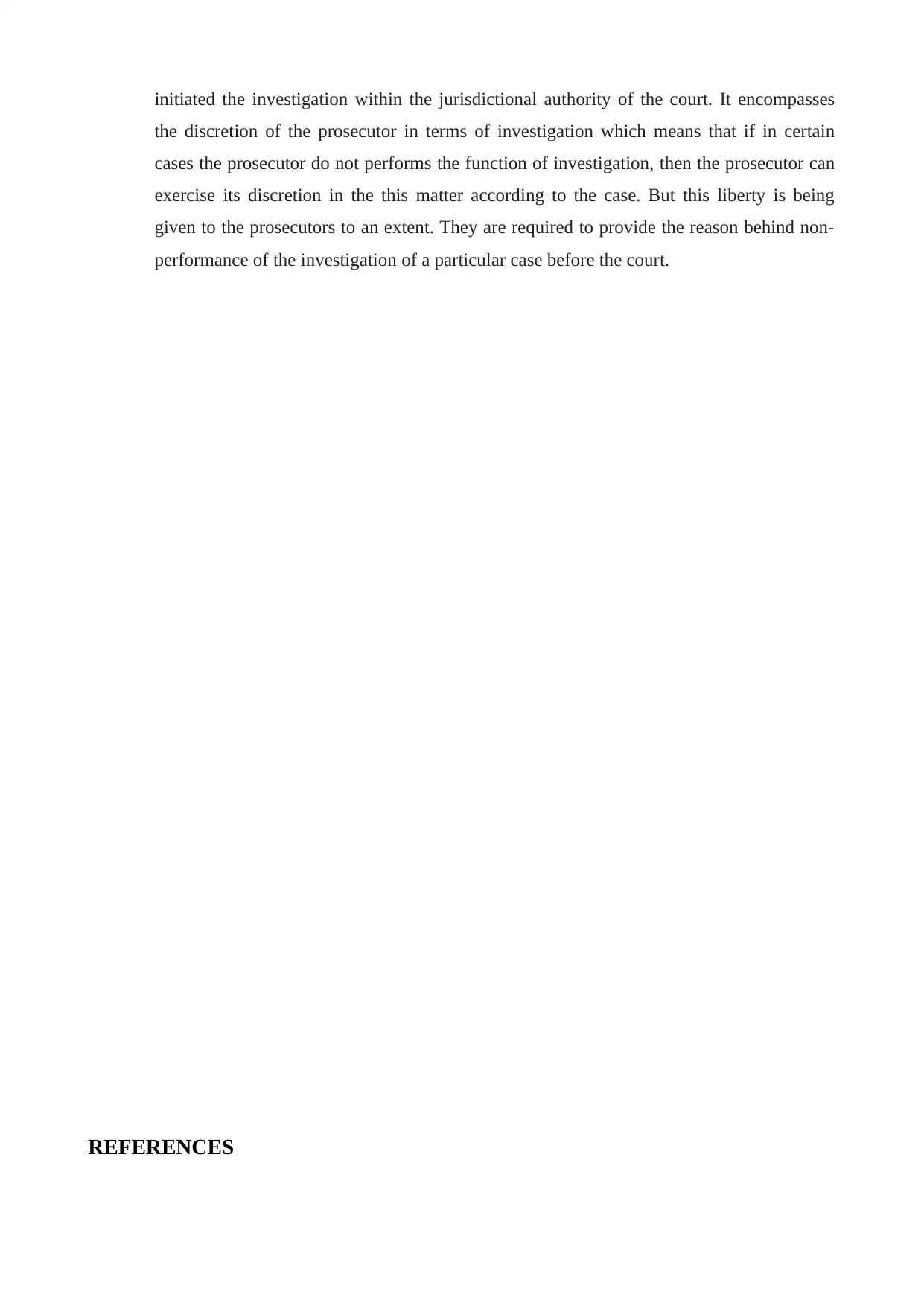
initiated the investigation within the jurisdictional authority of the court. It encompasses
the discretion of the prosecutor in terms of investigation which means that if in certain
cases the prosecutor do not performs the function of investigation, then the prosecutor can
exercise its discretion in the this matter according to the case. But this liberty is being
given to the prosecutors to an extent. They are required to provide the reason behind non-
performance of the investigation of a particular case before the court.
REFERENCES
the discretion of the prosecutor in terms of investigation which means that if in certain
cases the prosecutor do not performs the function of investigation, then the prosecutor can
exercise its discretion in the this matter according to the case. But this liberty is being
given to the prosecutors to an extent. They are required to provide the reason behind non-
performance of the investigation of a particular case before the court.
REFERENCES
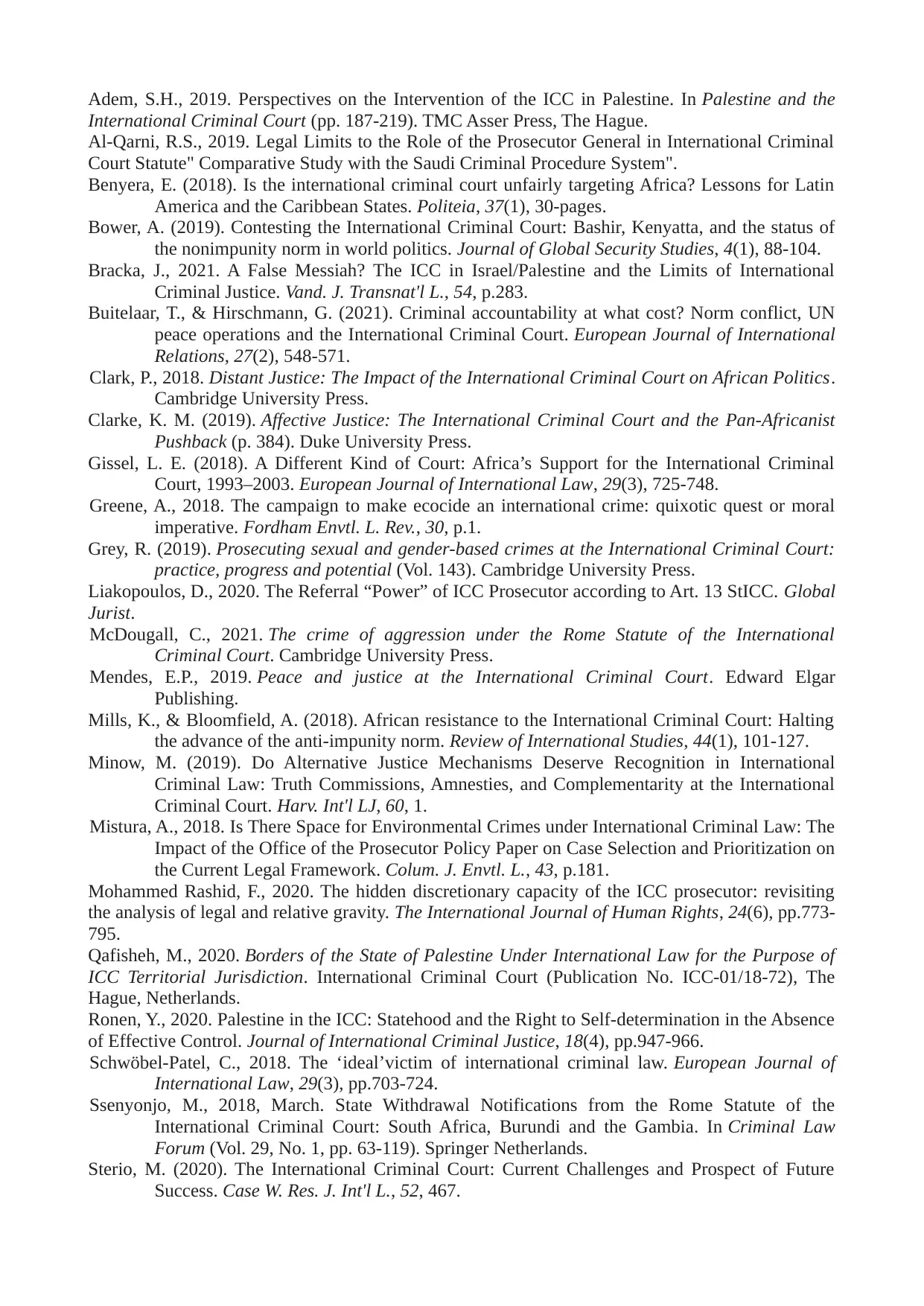
Adem, S.H., 2019. Perspectives on the Intervention of the ICC in Palestine. In Palestine and the
International Criminal Court (pp. 187-219). TMC Asser Press, The Hague.
Al-Qarni, R.S., 2019. Legal Limits to the Role of the Prosecutor General in International Criminal
Court Statute" Comparative Study with the Saudi Criminal Procedure System".
Benyera, E. (2018). Is the international criminal court unfairly targeting Africa? Lessons for Latin
America and the Caribbean States. Politeia, 37(1), 30-pages.
Bower, A. (2019). Contesting the International Criminal Court: Bashir, Kenyatta, and the status of
the nonimpunity norm in world politics. Journal of Global Security Studies, 4(1), 88-104.
Bracka, J., 2021. A False Messiah? The ICC in Israel/Palestine and the Limits of International
Criminal Justice. Vand. J. Transnat'l L., 54, p.283.
Buitelaar, T., & Hirschmann, G. (2021). Criminal accountability at what cost? Norm conflict, UN
peace operations and the International Criminal Court. European Journal of International
Relations, 27(2), 548-571.
Clark, P., 2018. Distant Justice: The Impact of the International Criminal Court on African Politics.
Cambridge University Press.
Clarke, K. M. (2019). Affective Justice: The International Criminal Court and the Pan-Africanist
Pushback (p. 384). Duke University Press.
Gissel, L. E. (2018). A Different Kind of Court: Africa’s Support for the International Criminal
Court, 1993–2003. European Journal of International Law, 29(3), 725-748.
Greene, A., 2018. The campaign to make ecocide an international crime: quixotic quest or moral
imperative. Fordham Envtl. L. Rev., 30, p.1.
Grey, R. (2019). Prosecuting sexual and gender-based crimes at the International Criminal Court:
practice, progress and potential (Vol. 143). Cambridge University Press.
Liakopoulos, D., 2020. The Referral “Power” of ICC Prosecutor according to Art. 13 StICC. Global
Jurist.
McDougall, C., 2021. The crime of aggression under the Rome Statute of the International
Criminal Court. Cambridge University Press.
Mendes, E.P., 2019. Peace and justice at the International Criminal Court. Edward Elgar
Publishing.
Mills, K., & Bloomfield, A. (2018). African resistance to the International Criminal Court: Halting
the advance of the anti-impunity norm. Review of International Studies, 44(1), 101-127.
Minow, M. (2019). Do Alternative Justice Mechanisms Deserve Recognition in International
Criminal Law: Truth Commissions, Amnesties, and Complementarity at the International
Criminal Court. Harv. Int'l LJ, 60, 1.
Mistura, A., 2018. Is There Space for Environmental Crimes under International Criminal Law: The
Impact of the Office of the Prosecutor Policy Paper on Case Selection and Prioritization on
the Current Legal Framework. Colum. J. Envtl. L., 43, p.181.
Mohammed Rashid, F., 2020. The hidden discretionary capacity of the ICC prosecutor: revisiting
the analysis of legal and relative gravity. The International Journal of Human Rights, 24(6), pp.773-
795.
Qafisheh, M., 2020. Borders of the State of Palestine Under International Law for the Purpose of
ICC Territorial Jurisdiction. International Criminal Court (Publication No. ICC-01/18-72), The
Hague, Netherlands.
Ronen, Y., 2020. Palestine in the ICC: Statehood and the Right to Self-determination in the Absence
of Effective Control. Journal of International Criminal Justice, 18(4), pp.947-966.
Schwöbel-Patel, C., 2018. The ‘ideal’victim of international criminal law. European Journal of
International Law, 29(3), pp.703-724.
Ssenyonjo, M., 2018, March. State Withdrawal Notifications from the Rome Statute of the
International Criminal Court: South Africa, Burundi and the Gambia. In Criminal Law
Forum (Vol. 29, No. 1, pp. 63-119). Springer Netherlands.
Sterio, M. (2020). The International Criminal Court: Current Challenges and Prospect of Future
Success. Case W. Res. J. Int'l L., 52, 467.
International Criminal Court (pp. 187-219). TMC Asser Press, The Hague.
Al-Qarni, R.S., 2019. Legal Limits to the Role of the Prosecutor General in International Criminal
Court Statute" Comparative Study with the Saudi Criminal Procedure System".
Benyera, E. (2018). Is the international criminal court unfairly targeting Africa? Lessons for Latin
America and the Caribbean States. Politeia, 37(1), 30-pages.
Bower, A. (2019). Contesting the International Criminal Court: Bashir, Kenyatta, and the status of
the nonimpunity norm in world politics. Journal of Global Security Studies, 4(1), 88-104.
Bracka, J., 2021. A False Messiah? The ICC in Israel/Palestine and the Limits of International
Criminal Justice. Vand. J. Transnat'l L., 54, p.283.
Buitelaar, T., & Hirschmann, G. (2021). Criminal accountability at what cost? Norm conflict, UN
peace operations and the International Criminal Court. European Journal of International
Relations, 27(2), 548-571.
Clark, P., 2018. Distant Justice: The Impact of the International Criminal Court on African Politics.
Cambridge University Press.
Clarke, K. M. (2019). Affective Justice: The International Criminal Court and the Pan-Africanist
Pushback (p. 384). Duke University Press.
Gissel, L. E. (2018). A Different Kind of Court: Africa’s Support for the International Criminal
Court, 1993–2003. European Journal of International Law, 29(3), 725-748.
Greene, A., 2018. The campaign to make ecocide an international crime: quixotic quest or moral
imperative. Fordham Envtl. L. Rev., 30, p.1.
Grey, R. (2019). Prosecuting sexual and gender-based crimes at the International Criminal Court:
practice, progress and potential (Vol. 143). Cambridge University Press.
Liakopoulos, D., 2020. The Referral “Power” of ICC Prosecutor according to Art. 13 StICC. Global
Jurist.
McDougall, C., 2021. The crime of aggression under the Rome Statute of the International
Criminal Court. Cambridge University Press.
Mendes, E.P., 2019. Peace and justice at the International Criminal Court. Edward Elgar
Publishing.
Mills, K., & Bloomfield, A. (2018). African resistance to the International Criminal Court: Halting
the advance of the anti-impunity norm. Review of International Studies, 44(1), 101-127.
Minow, M. (2019). Do Alternative Justice Mechanisms Deserve Recognition in International
Criminal Law: Truth Commissions, Amnesties, and Complementarity at the International
Criminal Court. Harv. Int'l LJ, 60, 1.
Mistura, A., 2018. Is There Space for Environmental Crimes under International Criminal Law: The
Impact of the Office of the Prosecutor Policy Paper on Case Selection and Prioritization on
the Current Legal Framework. Colum. J. Envtl. L., 43, p.181.
Mohammed Rashid, F., 2020. The hidden discretionary capacity of the ICC prosecutor: revisiting
the analysis of legal and relative gravity. The International Journal of Human Rights, 24(6), pp.773-
795.
Qafisheh, M., 2020. Borders of the State of Palestine Under International Law for the Purpose of
ICC Territorial Jurisdiction. International Criminal Court (Publication No. ICC-01/18-72), The
Hague, Netherlands.
Ronen, Y., 2020. Palestine in the ICC: Statehood and the Right to Self-determination in the Absence
of Effective Control. Journal of International Criminal Justice, 18(4), pp.947-966.
Schwöbel-Patel, C., 2018. The ‘ideal’victim of international criminal law. European Journal of
International Law, 29(3), pp.703-724.
Ssenyonjo, M., 2018, March. State Withdrawal Notifications from the Rome Statute of the
International Criminal Court: South Africa, Burundi and the Gambia. In Criminal Law
Forum (Vol. 29, No. 1, pp. 63-119). Springer Netherlands.
Sterio, M. (2020). The International Criminal Court: Current Challenges and Prospect of Future
Success. Case W. Res. J. Int'l L., 52, 467.
Secure Best Marks with AI Grader
Need help grading? Try our AI Grader for instant feedback on your assignments.
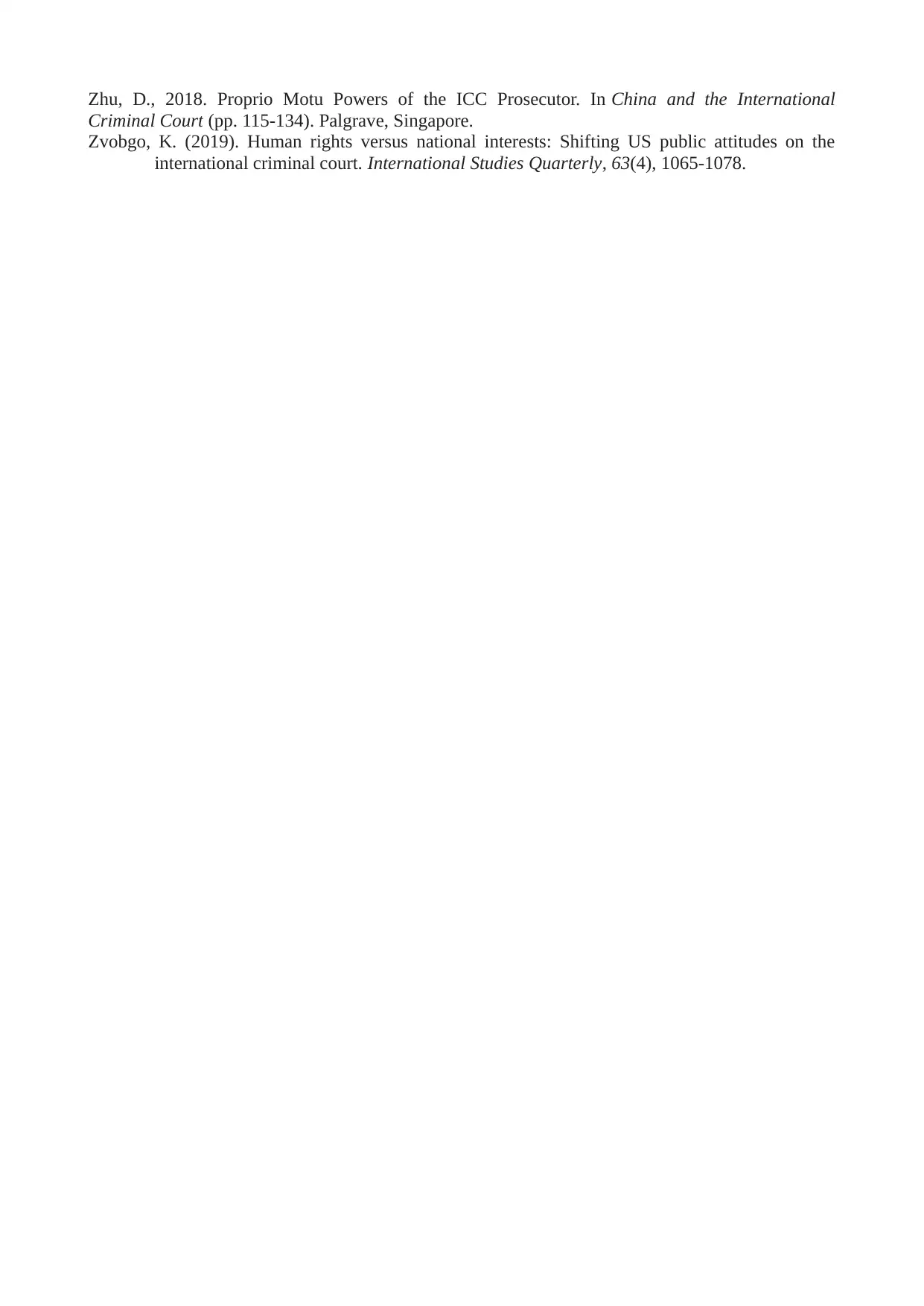
Zhu, D., 2018. Proprio Motu Powers of the ICC Prosecutor. In China and the International
Criminal Court (pp. 115-134). Palgrave, Singapore.
Zvobgo, K. (2019). Human rights versus national interests: Shifting US public attitudes on the
international criminal court. International Studies Quarterly, 63(4), 1065-1078.
Criminal Court (pp. 115-134). Palgrave, Singapore.
Zvobgo, K. (2019). Human rights versus national interests: Shifting US public attitudes on the
international criminal court. International Studies Quarterly, 63(4), 1065-1078.
1 out of 17
Related Documents
Your All-in-One AI-Powered Toolkit for Academic Success.
+13062052269
info@desklib.com
Available 24*7 on WhatsApp / Email
![[object Object]](/_next/static/media/star-bottom.7253800d.svg)
Unlock your academic potential
© 2024 | Zucol Services PVT LTD | All rights reserved.





